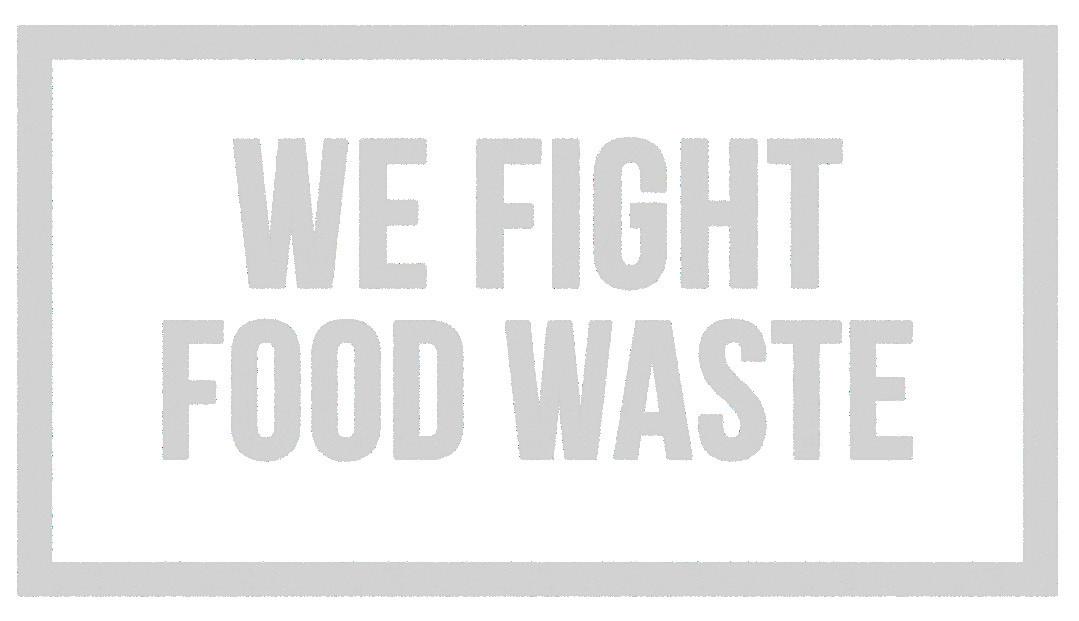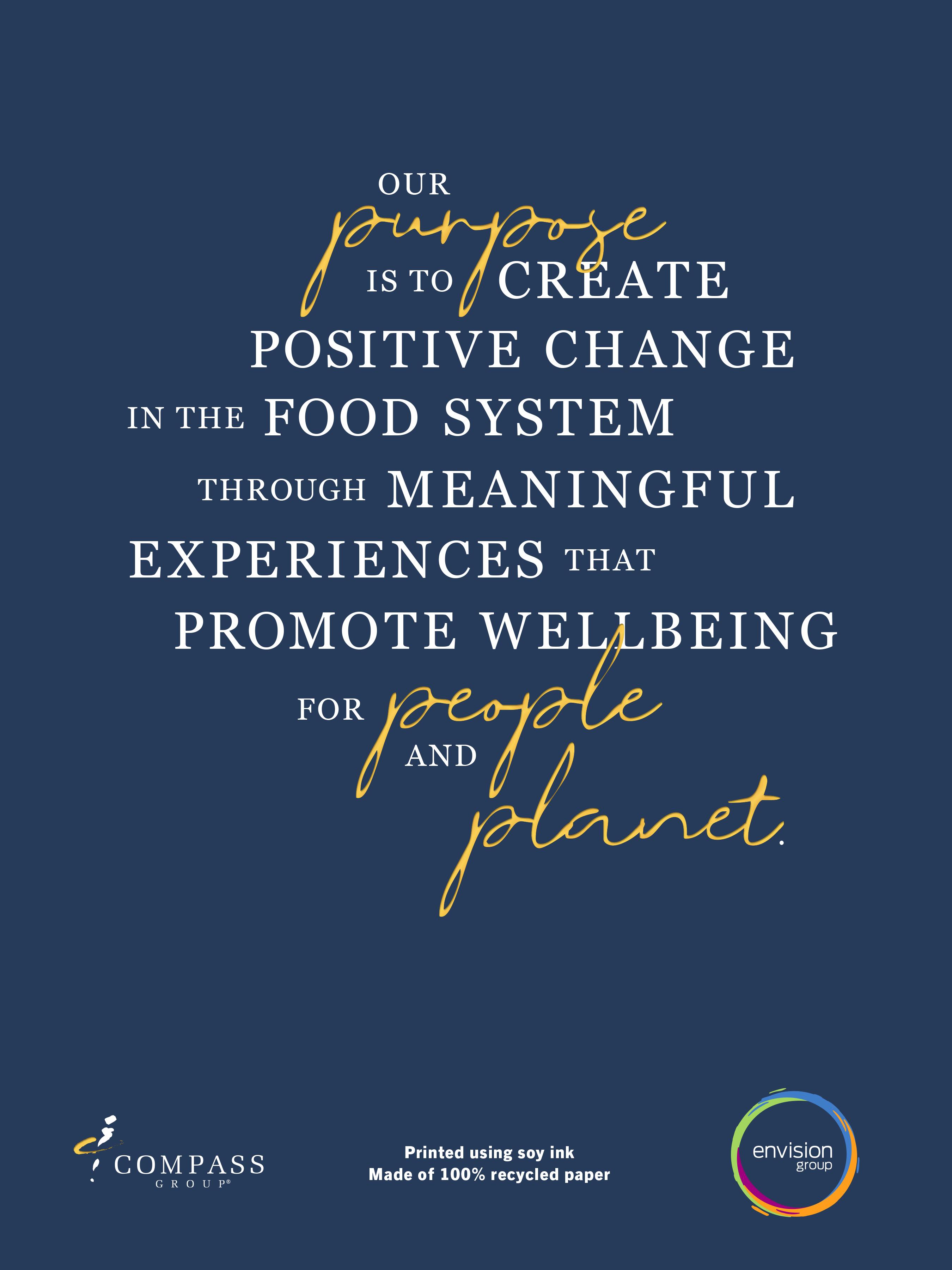




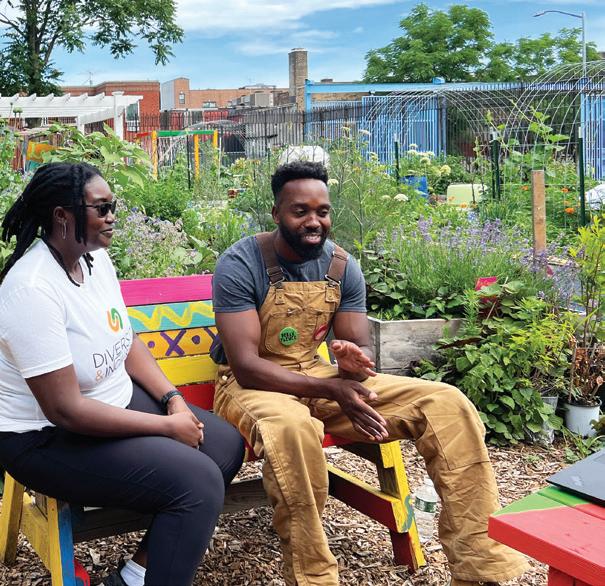























We continue to be better and do better every day for our clients, guests and partners. We leverage our scale and expertise to inspire change, and together we are creating a more sustainable future for all.
2022 was an incredible year of firsts for Compass Group.
We launched our industry-first Sustainable Financing Framework, enabling us to issue two green bonds to support our ESG initiatives. These bonds will help us meet our bold sciencebased targets.
We also celebrated our partnership with Thompson Hospitality. 2022 marked 25 years of working together to make our supply chain and operations more diverse by increasing supplier diversity spend, elevating DEI-focused initiatives across organizations, supporting more inclusive experiences for communities, and providing joint venture associates with access to a career for life.
Our growing facilities services business continues to leverage technology and implement energy-efficient and sustainable green practices. These pioneering efforts earned our Crothall team the Business Intelligence Group's 2022 Sustainability Award.
We launched the first edition of our Stop Food Waste Day Global Cookbook. Compass Group Chefs from around the world contributed their delicious recipes and heartfelt stories to inspire change at home. Stop Food Waste Day was also celebrated globally with virtual events that brought experts, guests and clients together. Our Chefs educated guests in cafes through Teaching Kitchens and inspired change with delicious zero-waste recipes.
Waste Not 2.0, our state-of-the-art tablet-based waste tracking program, is helping us tackle food waste in our kitchens. We deployed to over 1,800 kitchens, and operations with the tool have reduced food waste by more than 25%. Waste Not 2.0 has expanded globally, and we look forward to other countries seeing great success.
With these successes and strides, we also recognize that the challenge before us is great. The change needed in the food system to reach our goals will only happen through collaboration. No one company, industry or government can accomplish this alone. We will usher in a more sustainable future together through collective innovation, strategic partnerships, proprietary tools and a dedicated vision.
We are continually grateful for your collaboration, commitment and willingness to evolve as we navigate this sustainability journey.
Please enjoy reading about our collective achievements in Our Story I want to give special thanks to our incredible people, without whom these accomplishments would never have been possible.
Amy Keister Global Director of Sustainability

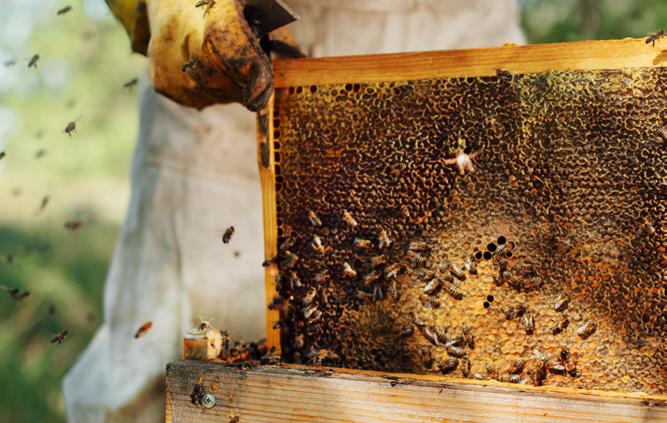


2007
Commits to purchasing 100% Certified Humane cage free shell eggs
Commits to using oils and other products free from artificial trans-fat
Commits to reduce sodium by 10% by 2010
2009
Implements the ‘Be a Flexitarian’ campaign
2010
Creates Carbon Foodprint
Signs agreement with Coalition of Immokalee Workers
2011
Receives Goldie Award for Best Healthy Menu Concept for Whole + Sum
2013
Joins Menus of Change
2015
Starts the Imperfectly Delicious Produce program
Joins the Seafood Roundtable to accelerate positive change for our oceans
2005
Forms partnership with Monterey Bay Aquarium’s Seafood Watch Program
1995
Flik & Bon Appetit Management Company commit to zero trans-fat frying oil
2021
Sets Net Zero Targets
Transitions 100% of our liquid eggs to Certified Humane cage free
Partners with FoodTank for Stop Food Waste Day
Virtual Event
Joins the Single Use Materials Decelerator Group
Implements Regenerative Agriculture program
Creates the Supplier Diversity Accelerator
2022
Releases the SFWD Cookbook
Becomes first foodservice company to issue a Sustainable Bond
Participates in the UN Forum on Business and Human Rights
2020
Develops Waste Not 2.0
Partners with Google Food and Arizona State University to launch RePlant Your Menus Culinary Training
2019
Receives the Sustainability, Environmental, Achievement and Leadership (SEAL) Award for Carbon Foodprint
Joins the U.S. Food Loss & Waste Champions 2030 Group
Commits to reducing food waste by 50% by 2030
2018
Restaurant Associates and Bon Appetit Management Company commit to ban plastic straws
Implements Chef Appreciation Week
2017
Creates first Annual Stop Food Waste Day
Transitions ground turkey to No Antibiotics Ever
Develops Waste Not
2016
Receives the Good Egg Award in honor of our cage-free egg commitment




31 Purchasedmore than Million Pounds of No Antibiotics Ever (NAE) Meat
more than Purchased
4.5 Million Pounds of Produce from the Coalition of Immokalee Workers (CIW)
760 Donated Thousand Meals to Local Communities
more than Million from Diverse Suppliers
560 Purchased more than
2.7 more than Purchased Million Pounds of Plant-Based Meat Alternatives
40% Goal: 25% Eco / Fair Trade Certified Coffee 3,781,721 lbs
2 Purchasedmore than Million Pounds of Produce from the Equitable Food Initiative (EFI)
87 % Goal: 100% Poultry produced without the routine use of human antibiotics 107,098,249 lbs


84% Goal: 100% Seafood from sustainable sources (SFW Criteria)

9,955,718 lbs



Source: The Hartman Group Sustainability 2021 Report
COMPASS GROUP is doing What
We focus on serving food that will nourish our guests and create change for a healthier planet. Compass Group is committed to showing leadership in responsible sourcing practices such as prioritizing local products, humanely raised animal proteins, and sustainably sourced seafood. We are committed to driving supplier diversity and intentionally promoting minority and women-owned businesses.
90% of consumers consider at least one issue related to sustainability when choosing food and beverages.
On a mission to collaborate with hyper-local partners, Chartwells Higher Ed at UChicago Dining is targeting more women and minority-owned vendors within the 8 zip codes surrounding the university. This past year, 31% of their total spend was allocated to Minority and Women-Owned Businesses and hyper-local vendors meeting this requirement.

These partnerships extend into events that celebrate culture and international cuisine. During Black History Month, the team hosted ChARTwells, a day featuring Black artists and cuisine with special guest Chef Bryant Terry, an African-American vegan chef, and food justice activist. The menu takeover at Woodlawn Dining Commons featured a traditional dish of lentil, okra and coconut stew, braised goat with curried corn and coconut rice, plus jerk chicken ramen.
Chef Bryant was joined by other tastemakers and industry leaders in the Hyde Park community, also known as the Chicago South Side, for a panel discussing the interconnectedness between food, art and culture, and the experiences each panelist had in their careers and lives at the Reva and David Logan Center for the Arts.
Renowned artist and Chicago South-Sider Amanda Williams moderated the 90-minute panel discussion that included Chef Bryant along with:
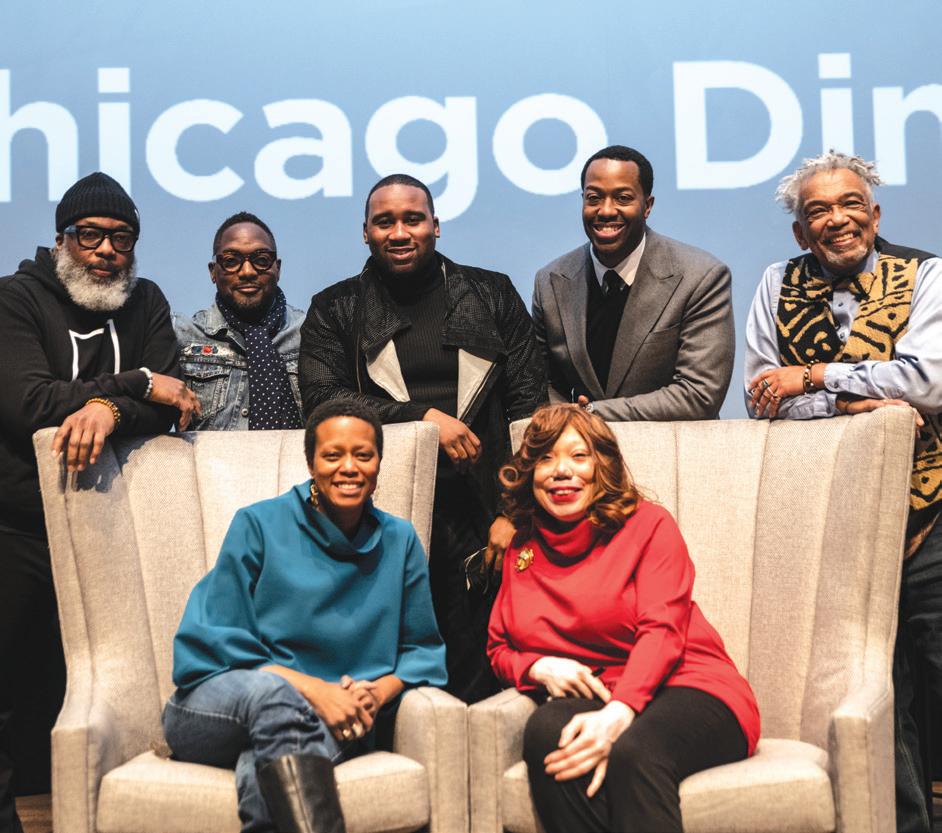
• Chef Cliff Rome, chef and owner of the Rome's Joy companies, based in Chicago
• Charla Draper, former food editor of both Ebony Magazine and Southern Living
• Patric McCoy, art collector and president of Diasporal Rhythms
UChicago Dining prides itself on collaborating with hyper-local elementary schools and nonprofits that offer services in the community, such as housing for veterans, support for women and children, workforce development, violence prevention and employment opportunities. Considering these non-profits are located within food apartheids, Chartwells has donated nearly 1 ton of fresh produce, dairy, perishable and non-perishable items in efforts to provide healthy food options. Chartwells is looking forward to expanding upon the current relationships established and extending our collaboration efforts to citizens, vendors, and organizations most in need.
When Chef Will Pfeffer learned the global bee population was on the decline and directly affecting the world’s food supply and wildlife biodiversity, he began an apprenticeship to learn how to become a beekeeper. Over the last six months, Chef Will started three beehive colonies at the IBM Learning Center in Armonk, NY, causing a buzz while supporting FLIK’s commitment to local and sustainable practices.
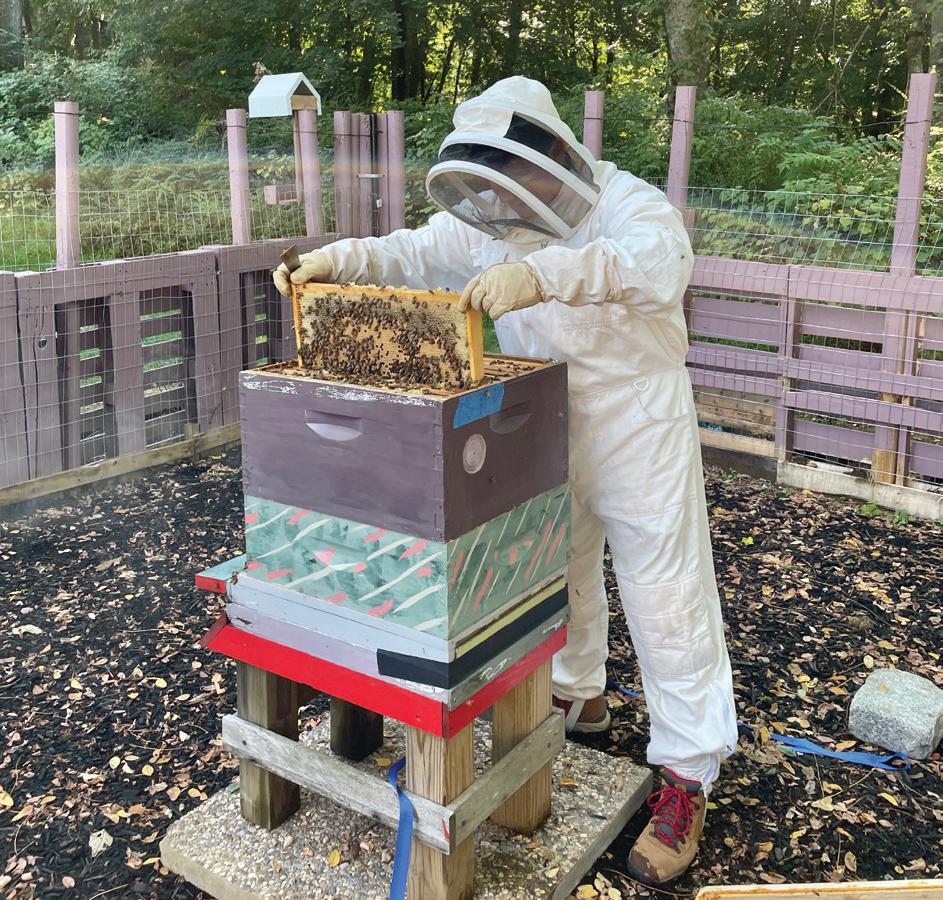
Bees are responsible for helping pollinate an estimated 87% of flowering plants and 75% of crops including almonds, blueberries, apples, broccoli, peppers and cherries. Conservationists and scientists who study food security are concerned about how the downward trend of bee populations will affect food supply for years to come.
FLIK Hospitality Group’s core values are rooted in supporting sustainable practices and celebrating all things local with a food philosophy that highlights seasonal offerings. Chef Will has taken this practice to heart throughout his career with FLIK.
Next year, he plans to increase the biodiversity of his own colonies by planting wildflowers and adding two additional hives to the space. “This has truly been a passion project of mine and I’m so excited to watch it grow,” said Chef Will.

A decommissioned freight container converted into a hydroponic greenhouse provides students at Stony Brook University with extremely local produce funded by CulinArt Group, the on-campus dining services provider. This partnership saves on product cost and helps teach students valuable lessons in sustainability and carbon-footprint reduction.
Stony Brook was the first university in the United States to acquire a Freight Farms shipping container seven years ago and situated it near the loading dock of a resident dining hall. Built-in technologies control the air, light, water and space inside, transforming it into a year-round producer of butter crunch lettuce, radishes and kale.
Students plant seedlings in trays every August just as they are returning to campus for the fall semester. After a brief germination period and roots take hold, the seedlings are transferred to vertical grow towers where they complete the growing cycle.
After a bit of an off-year due to the pandemic, the farm bounced back in a big way producing 165 pounds of edible produce during the 2021-22 academic year.
Freight Farms produce is used in various dishes served in the SBU dining halls, such as Miso Sesame Glazed Tofu with baby leaf lettuce and Lamb Burger with Asian greens. The harvest has also found its way to SBU’s on-campus food pantry.
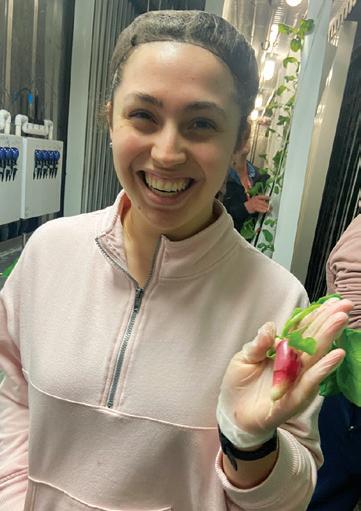
Registered Dietitian Melissa Ortega and the dining team launched 'Food for Thought,’ a series that supports the client's mission to foster a vibrant and inclusive senior community committed to justice, peace and care of the Earth. In partnership with Pilgrim Place, Unidine’s commitment to its Fresh Food Pledge delivers a meaningful wellness program that promotes health and sustainability through food.
Using data collected from the community’s Healthcare Clinic Supervisor, a series of topics were identified to focus on the residents’ interests and health concerns, including a diet that benefits the body and planet, as well as anti-inflammatory nutrition to blunt the effect of arthritic challenges - the top resident concern.
“Unidine’s eagerness to enable our residents to understand more completely the intersection of food and health has been most welcome. As residents age, we need to update our knowledge of appropriate nutrition. This series is an excellent tool for all of us,” said Janet Vandevender, Chairperson of the Dining Services Advisory Group at Pilgrim Place.
Purchasing locally is at the core of menus served throughout the community. Chef Michael Truong prepares dishes with ingredients grown on site in and farms from the area. RD Melissa shares the nutritional benefits of each one and their impact on the planet’s health.

“Our chefs publicize at our serving stations what items have come from local farmers directly or from the farmers market. This information tells us we are eating very fresh, local food and that Unidine is supporting sustainable farming in our community,” said Janet. “Pilgrim Place residents celebrate both of these!”
72% of purchases at Pilgrim Place are from local and regional farms, and purveyors.
To further spread the wellness and sustainability message, the onsite team worked with the Life Enhancement Supervisor to launch ‘Facts and Snacks' , an educational series offered monthly to engage residents with bite-sized messages and menu items from the Food for Thought series.
Children’s National Hospital strives to deliver products that reflect the diversity of their community, working with Morrison Healthcare and a network of women and minority entrepreneurs to make it happen.
One of those partners whose passion is sustainable, fresh and locally sourced food is Sarah Frimpong. She is the founder of Wellfound Foods in Washington, D.C. and leads a small team on a big mission to bring improved grab-n-go to the community. Built on the idea that people shouldn’t have to compromise quality for convenience, Wellfound supplies a wide variety of fresh foods in more than 50 vending machines in the area, three of which are located at Children’s National Hospital.
“Our growth can be directly tied to the opportunity provided to us by Morrison Healthcare and Children’s National,” said Sarah. “The visibility and favorable reception at the hospital have led to additional revenue, enabled us to increase hiring and ultimately scale our business.”
Following the success of Wellfound , the Morrison team introduced several new brands to the campus including Cureate , a female-owned business that sources local, sustainable products from small and minorityowned businesses; and climate-neutral Open Water , an LGBT women-owned company committed to sustainability by curbing the use of plastic. Their purified water is packaged in 100% recyclable and reusable aluminum cans.
“These partnerships are a prime example of how we can help our clients deliver healthy, nutritious food sourced from the community,” says Genevieve Potvin, Morrison Healthcare’s Senior Director of Nutrition Services at Children’s National.
As the D.C. area’s leading pediatric health system, relationships with these suppliers are more than just business. Some have family members who are cared for at the hospital, including the co-owner of LemonadeLove .
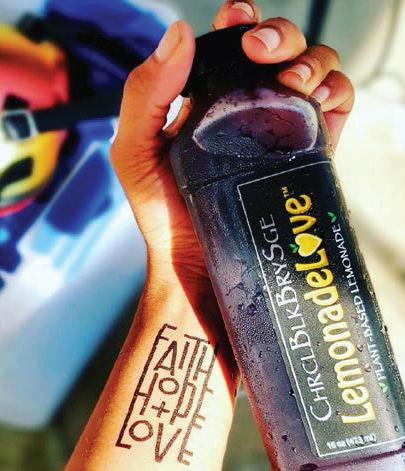
“My son has had nine successful surgeries at Children’s National,” said Zee Arenas. “He has always asked if we could sell our lemonades in the café so this will be our dream come true.”
Children’s National knows its neighbors count on them for high-quality medical care. Supporting these local businesses is another way to help bind the community together.
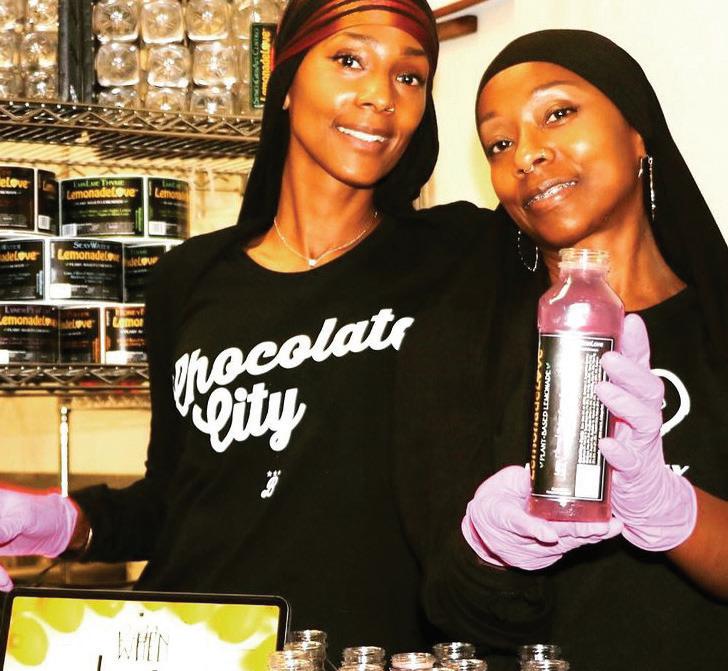
Anjali’s Cup is a woman and minority-owned company specializing in turmeric blends that nourish the body, nurture the soul, and taste divine. Founded by Anjali Bhargava, who uses the Shopify e-commerce platform to sell her products, is now featured at Shopify 's headquarters in partnership with Restaurant Associates (R/A).

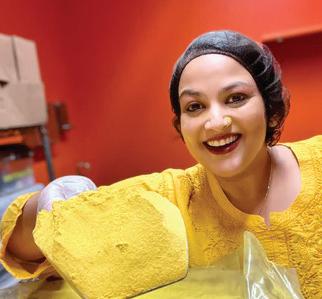
Heavily influenced by her Indian heritage and her own health journey with food and wellness, Anjali started creating a blend that helped her feel as good as it tasted. “My relationship to food, wellness, and the art of well-balanced ingredients is infused with the traditions, philosophy and practice of my family’s culture,” Anjali said.
The turmeric used in Anjali’s Cup is sustainably sourced, certified organic and grown in nutrient-dense volcanic soil on the Big Island of Hawaii. Products are showcased in the account at the Merchant Market and in April, Anjali shared her story in person with guests known as “Shopifolk.” They loved the connection and opportunity to learn more about the shared vision to give greater representation to diverse suppliers.
R/A recently collaborated with Anjali to create a dessert using her ingredients for the fall menu: Lemon Pound Cake with Turmeric Butter Cream and Macerated Berries. Executive Chef Andie McCarthy whipped Anjali's Resilience Turmeric Elixir powder into the butter cream and sprinkled some on top, 'even' creating a vegan, gluten-free version. It resulted in a truly delicious partnership, and the teams are looking forward to more in the future.
Miffy’s Muffin Mix started when a woman from Australia wanted to provide flavorful baked goods free of refined sweeteners. Eurest was introduced to Miffy Jones back in 2019 as the culinary team searched for whole grain bakery items to add to a major client’s daily menu and it’s been a rapid rise ever since.
Chefs were impressed that Miffy’s muffin, scone, waffle and pancake mixes are sweetened only by “grumpy bananas,” reducing food waste and saving money. Tasting the product pushed the team to get Miffy’s Muffin Mixes signed up as part of Foodbuy’s Diverse Supplier Accelerator Program .
“What is great about Miffy’s products is that when we introduced them, we didn’t feel like it was replacing anything we currently offered, but rather enhancing our culinary program by adding whole-grain options specifically at breakfast, coffee bars, and our dessert station where whole grain options were lacking,” said Director of Culinary Standards Meredith Galit.
Miffy’s Foods is a woman-owned business that is WBENC, SBA Tier One and Third Party Certified since 2018. The base mix is intentionally simple and loaded with healthy ingredients like whole wheat flour, oats and oat bran. Miffy’s new all-purpose baking mix lends itself to savory flavors as well, like delicious whole-grain jalapeno cheddar scones and buttermilk biscuits.
Eurest launched Miffy’s Mixes more broadly as part of Compass Group’s Stop Food Waste Day in 2022. Guest satisfaction was so positive locations across the country were encouraged to opt-in and receive an introductory shipment of Miffy’s products. This opportunity alone meant 175 new accounts received more than 260 cases of Miffy’s products, growing her business nationwide.
There’s a long runway for this partnership to continue to grow as Eurest reimagines its breakfast program. Chefs look forward to making more “happy muffins” out of “grumpy bananas,” as Miffy’s fun yet impactful slogan states.
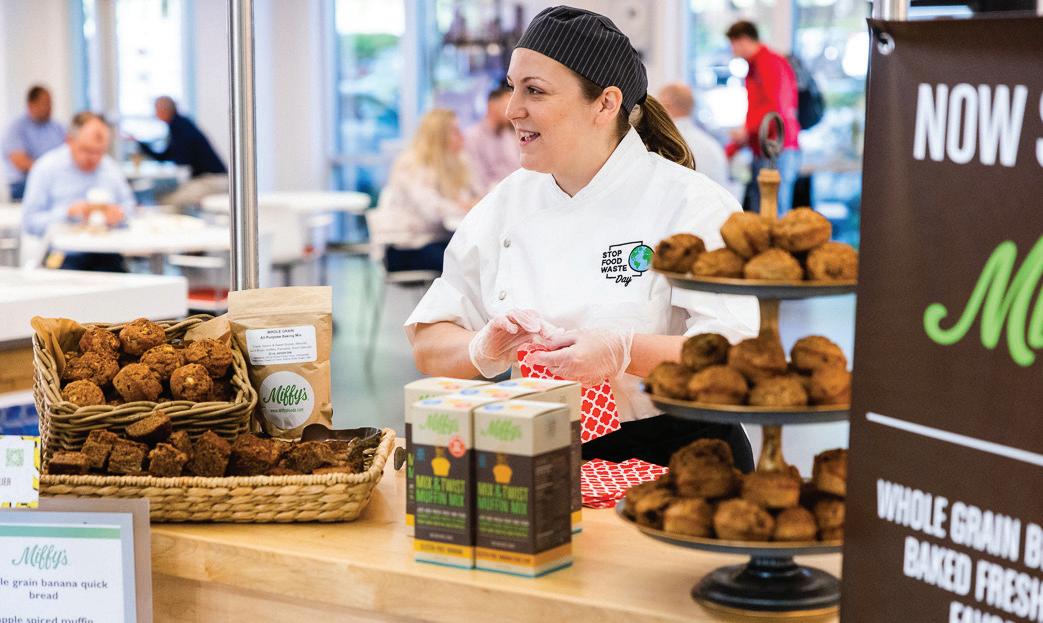
One significant piece of our strategic sustainability plan, particularly in produce, is to be more intentional with purchases and direct more spend toward the diverse farming community. During the summer of 2021, Compass Group and Foodbuy worked with produce distributor, FreshPoint, to launch the Black Indigenous and People of Color (BIPOC) Farmer pilot program to support local minority farmers in our home state of North Carolina.
“We’re spending quite a bit of time planning for the future and considering what sustainable foodservice procurement will look like moving forward,” says Foodbuy’s Senior Sustainability Manager Graham Givens.
Putting the strategy into action, Compass Group chefs support local farmers of color by featuring beautiful, seasonal produce on menus during peak season. Because of the pilot’s success, we continued the program in North Carolina by adding new farms and increasing purchases by 68% from the prior year.
In 2022, the program expanded to California in partnership with local produce distributor Vesta Foodservice. From June to October, our accounts in California purchased more than 100,000 pounds of local produce from farmers of color.
“Both farm-to-fork and diversity and inclusion are pillars in our culture,” explains Eurest Chef Manager Matthew Clark, who participated in the program. “The BIPOC Farmer program is a perfect way to highlight these values in our café, sharing with customers and clients that we source fresh, local produce while recognizing the people who work so hard every day to bring us such wonderful ingredients.”

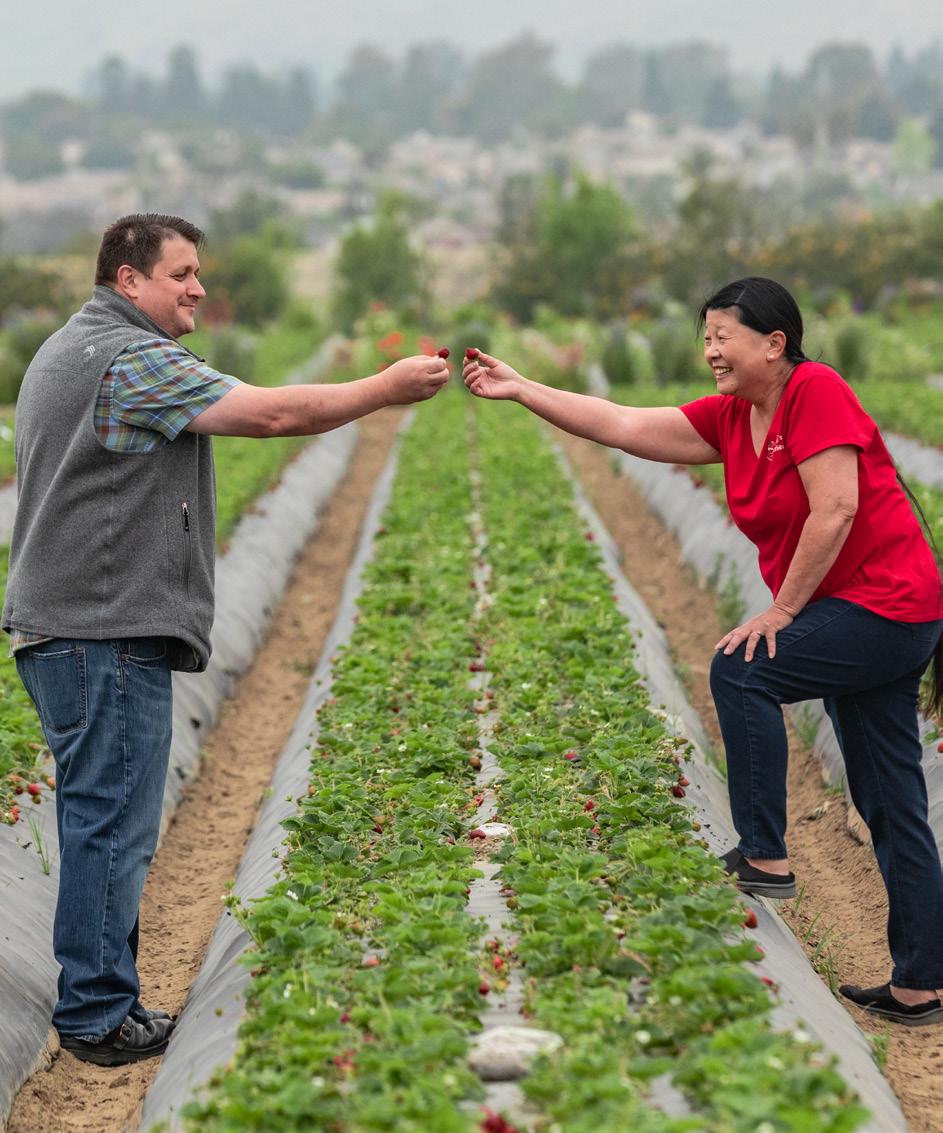
Wolfgang Puck Catering (WPC) teams proactively source and highlight local suppliers, local and regional farm partners, and minority-owned businesses to support the communities served. Through a partnership with Vesta Foodservice, participation in supplier accelerator programs and the BIPOC Farmer program, WPC is driving purchasing power to small, family and minorityowned businesses.
Wolfgang’s Eat. Love. Live. philosophy is largely focused on featuring local produce and dairy, purchasing organics when appropriate. The guiding principle is to buy the best possible ingredients while building collaborative and supportive relationships with farmers and suppliers.
The Fresno-based African-American Farmers of California organization serves as a testing area where new farmers can get hands-on experience growing a variety of produce. One of Scott Family Farms primary goals is to reintroduce Southern specialty crops that were part of the traditional African-American diet back into Black communities in an effort to help stop the obesity and diabetes epidemics.
A family owned and operated farm on the Central Coast of California, 2 Peas in a Pod has offered farm fresh produce, berries, dried beans and hops to farmers market locations, individual buyers and restaurants since 1985.
Founded in 1980, The Garlic Company has produced California garlic products for over 30 years. The company began as a simple packing house, selling whole bulbs of garlic to the marketplace. Over time, the company has advanced from a basic packing house to a unique food manufacturing facility.
30 years ago Valdivia Farms began on five acres of land. After moving to California from Mexico at just 19 years old, Francisco Valdivia worked at a friend’s farm before starting his own. Today, farming is very much a family affair with two of Francisco’s children and other relatives actively involved in the operation.
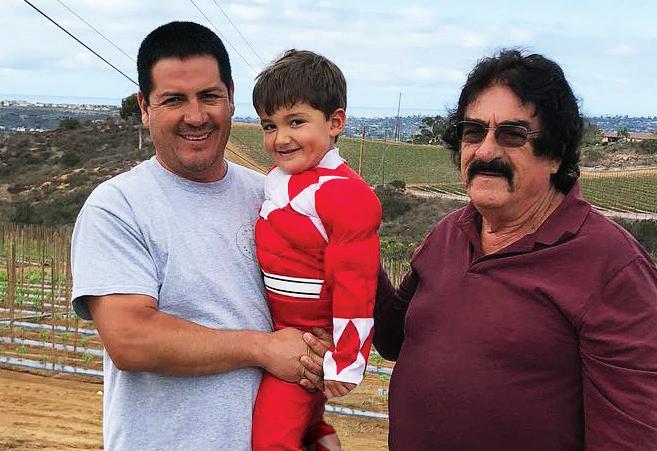
It all started with a wild idea: make the best extra virgin olive oil at an affordable price in California. For 20 years, California Olive Ranch continues to blend tradition with innovation and revolutionize the olive oil industry. Their growing and harvesting practices allow them to time the perfect peak harvest to create the best quality extra virgin olive oil possible all while making sustainable choices in growing, milling and packaging.

In collaboration with Cultivated-Levy and CxRA’s hospitality team-the world-class convention center located on Manhattan’s West Side hosts the centerpiece of a three-pronged sustainability program that focuses on reducing waste, sharing with the community and composting.
With a commitment to creating an eco-conscious guest experience, its 6.75-acre green roof is one of the largest in the United States and serves as a wildlife sanctuary for birds, bats and insects. In the past year, the Javits Center added the rooftop farm that includes a 3,500 square-foot greenhouse and 10,000 square-foot apple and pear orchard, which produces 50 seasonal crops. Led by Senior Executive Chef Andrew Matthews, Cultivated plans out menus to prominently feature the freshest seasonal crops. As of October, the team used 40,000 pounds of produce from the farm and 120 pounds of honey gathered from the 9 onsite beehives, which are bottled and shared at functions.
To date in 2022, the venue achieved an 80% waste-diversion rate in food and beverage operations, which includes composting and donating 3.4 tons of food to community organizations throughout New York City. Cultivated continues to partner with the Javits Center to evaluate new ways to enhance and improve the sustainability of its operations.
Climate Week NYC, held in part at the Javits Center, is one of the most widely attended summits aimed at driving climate action. Events included a pop-up market dubbed "Garden Eatery Social" with a focus on sustainably sourced food and beverage and a "Sustainability Kiosk" where Chef Matthews and Supervisor Crystal Goins taught guests how to pickle vegetables. The team held a special guest giveaway of Jacob’s Harvest products from the line of pickled produce and honey named after Jacob Javits, who served New York for more than 30 years in public office.
The Cultivated team at Javits Center is an example of taking action toward Compass Group’s pledge to sustainability through farming, sourcing and waste reduction. They are incredibly proud of planting the seeds–figuratively and literally–and leaning into the commitment of doing and being better.


WITH A ONE-ACRE FARM SURROUNDED BY SKYSCRAPERS, JAVITS CENTER IS CULTIVATING SUSTAINABLE HOSPITALITY WITH ITS ROOF-TO-TABLE CONCEPT THAT WILL CHALLENGE MILLIONS OF VISITORS PER YEAR TO THINK DIFFERENTLY ABOUT FOOD, FARMING AND THE FUTURE OF CITIES.
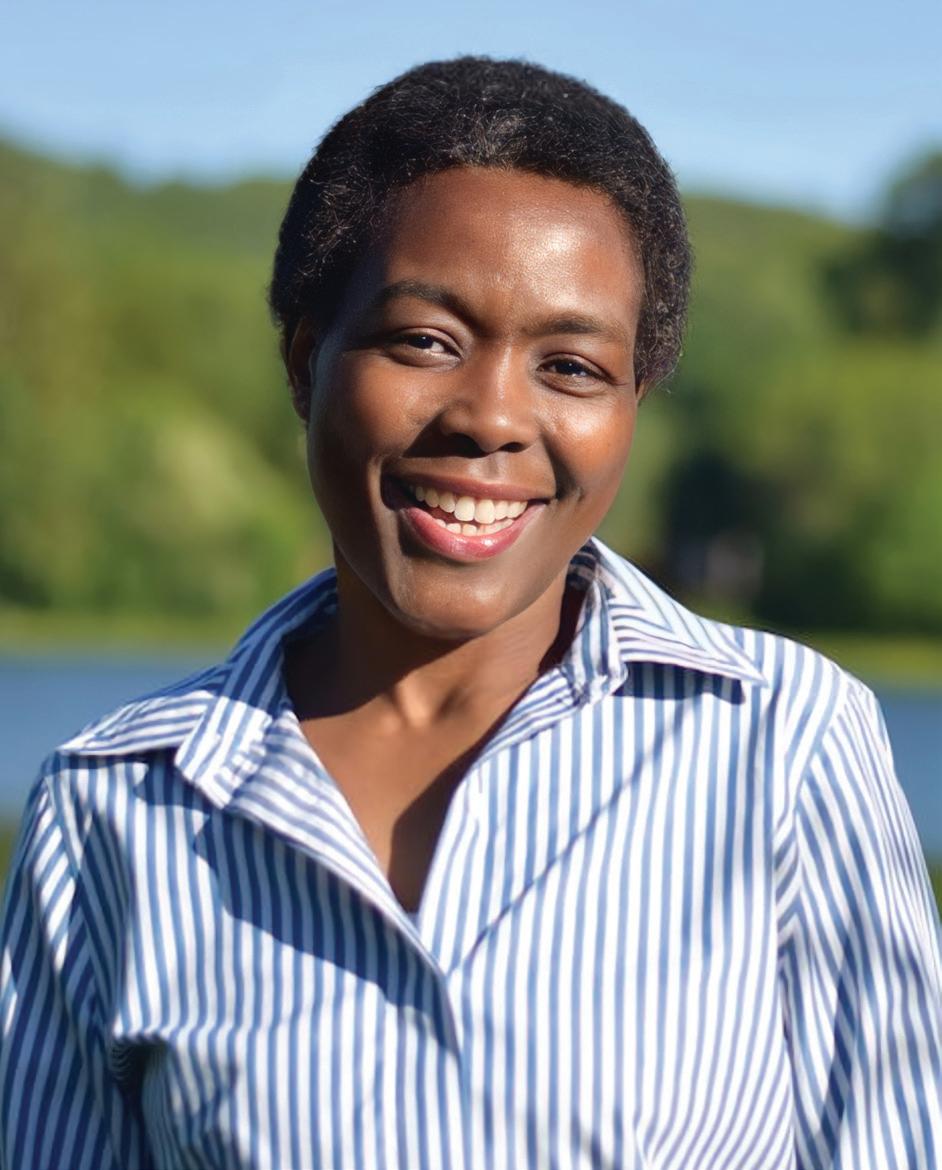
Creating a supply chain that prioritizes diversity and inclusion begins with an intentional sourcing strategy. At Compass Group, that means starting with its purchasing arm, Foodbuy. Diversity, Equity and Inclusion have been a focus area since Foodbuy’s inception in 1999 with a commitment to continually increase the number of diverse suppliers in its network, and annual spend.
"Our commitment to promoting diversity and inclusion starts with our supplier partnerships, ensuring everyone has an opportunity to succeed, regardless of size or background," says Foodbuy CEO, Dennis Hogan.
In 2021, efforts to highlight women and minorityowned businesses were amplified by creating the Diverse Supplier Accelerator Program . Now in its second year, this program aims to grow successful, diverse business enterprises through educational sessions, networking events and mentorship programs. The innovative program also includes developing and activating growth plans through individual coaching from the Foodbuy network.
Since then, Foodbuy expanded its supplier diversity team, continually evolving processes and programs to ensure both access and inclusivity of all suppliers. In total, 21 suppliers have participated in the program and Foodbuy is excited to welcome 10 more for 2023.
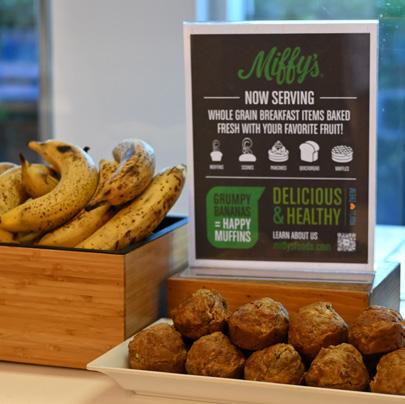
"This relationship has become the lynchpin for justifying investments needed to rapidly scale production capacity and meet anticipated business opportunities from Foodbuy and Compass Group. We are excited about the accelerated growth potential of our company because of this pioneering program. Our sincerest thanks and gratitude." - Global Village Foods , a small family business that believes in cooking with clean ingredients, creating bold African flavor and doing good in the community.
“Being selected as a participant in the 2022 Foodbuy Diverse Supplier Accelerator Program was an absolute game changer! As a leader in the industry, Foodbuy created a platform that 100% supports the development and growth of minority-owned businesses, like mine. Realizing my voice and ideas were welcomed and heard was truly a breath of fresh air. They recognize that every innovative, and delicious, idea starts small.” - woman-owned Miffy's Foods , a delicious line of whole grain and gluten-free muffin mixes that only requires adding fruit.
Compass Group is proud to be a company that takes the lead on responsible sourcing practices, committed to serving food that will nourish our guests and create change for a healthier planet. As the first foodservice company to pledge to purchasing sustainably caught tuna and cage-free eggs, we became an industry leader as others quickly followed suit. Compass Group remains committed to eliminating pork from pigs bred using gestation crates in its U.S. supply chain, steadily increasing the percentage of higher-welfare pork purchased in a phased approach and as supply allows. By Summer 2023, we will transition at a minimum to group-housed pork, which are pigs crated for 5 to 7 days, with our priority being to source gestation crate-free pork.
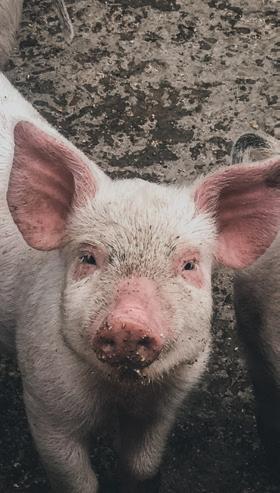
The United Nations Forum on Business & Human Rights invited Graham Givens, Foodbuy’s Senior Sustainability Manager, to provide his perspective on Compass Group’s 13-year-long, first-of-its-kind strategic partnership with the Coalition of Immokalee Workers and their Fair Food Program. The Fair Food Program is one of the longest-standing and most advanced worker-driven models currently in existence.
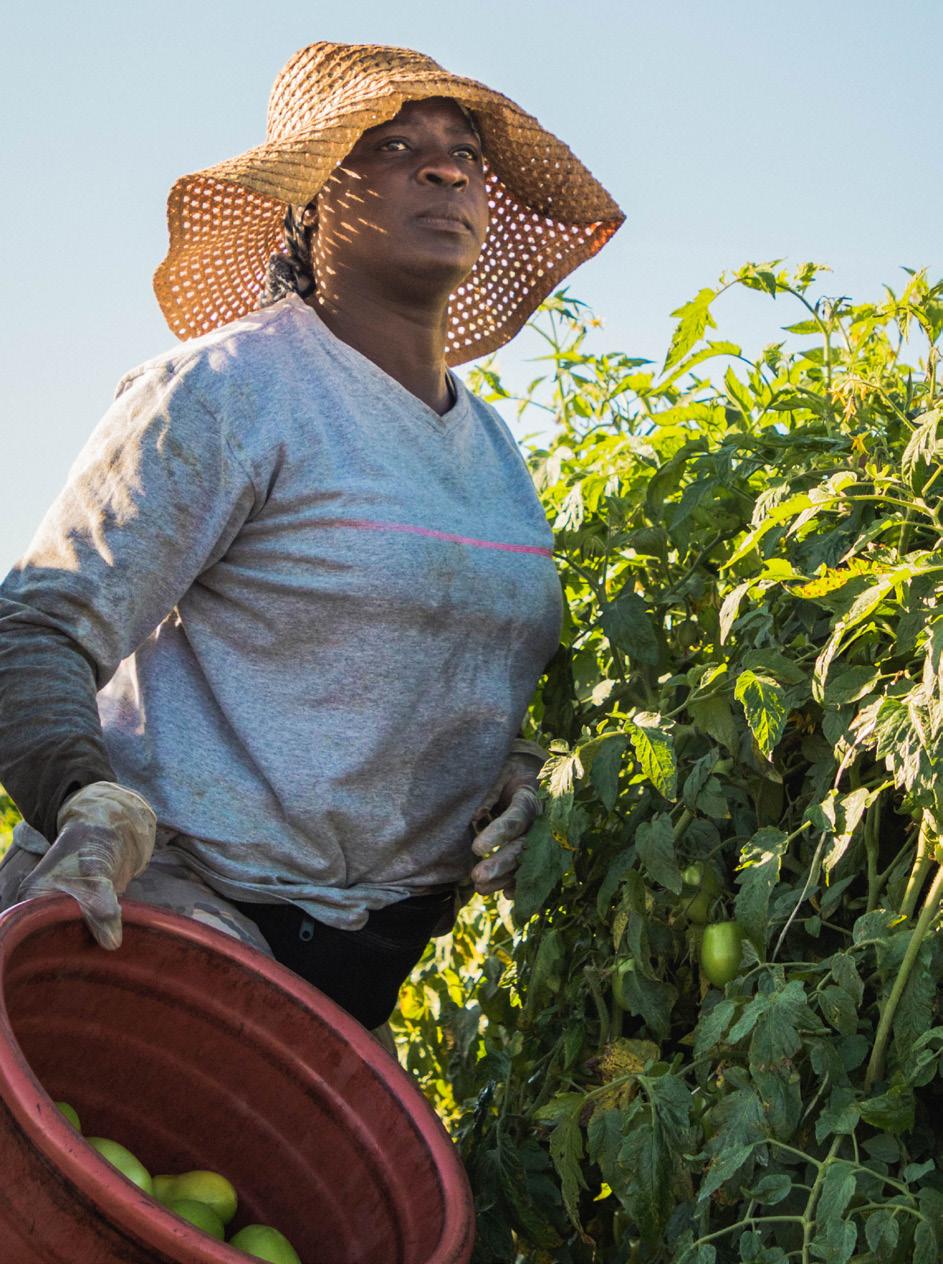
"Our journey together began in 2009 when we announced a commitment to pay a premium for fresh tomatoes purchased from certified growers in Florida, which supplements workers’ wages on those farms," said Graham, a panelist at the world's largest annual gathering on business and human rights. “I believe our participation demonstrates a deep commitment to improving the lives of people who are essential to the food system.”
This program was organized by the Coalition of Immokalee Workers who pioneered a farmworkerled, market-enforced approach to the protection of human rights in corporate supply chains.
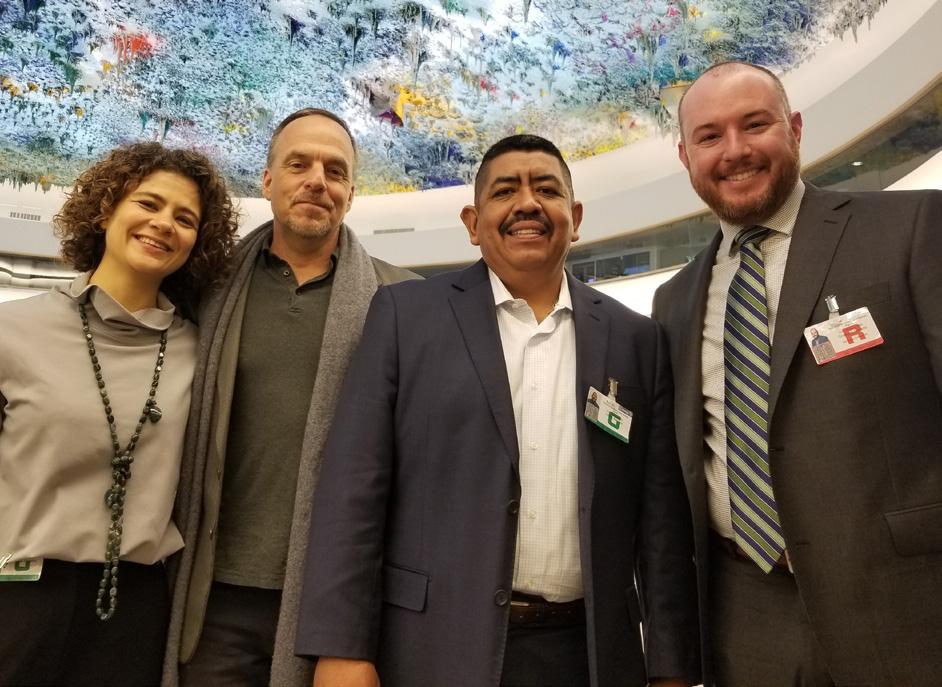
The Fair Food Program is all about promoting human rights:
• Its code of conduct was developed by the farmworkers themselves
• It includes a 24/7 complaint resolution process for workers
• It encourages collaboration with buyers to use their purchasing scale to drive change
“As we find opportunities to expand with the Coalition, we continue to share the story and build awareness of its success hoping to inspire others to join us,” said Graham. This partnership has created a gold standard for the protection of human rights across our supply chain. Over the past several years, the worker-driven social responsibility paradigm is being replicated in other industries and countries.
Panelists from Left to Right:
Antonella Angelini, Research Fellow at the Institute for Business Ethics
Greg Asbed, Cofounder Coalition of Immokalee Workers
Lucas Benitez, Cofounder Coalition of Immokalee Workers
Graham Givens, Sr. Sustainability Manager at Foodbuy USA
Not pictured: Moderator Fernanda Hopenhaym, Chairperson UN Working Group on Business and Human Rights

Approximately one-third of all food produced globally is wasted every year.
We are driving change from the inside out with the commitment to reduce food waste by 50% by 2030, joining the U.S. Food Loss and Waste 2030 Champions and aligning with the United Nation’s Social Development Goals. We are also supporters of the U.S. Food Loss and Waste Action Plan
 Source: United Nations
Source: United Nations
Knowing ‘what gets measured, gets managed’ fueled widespread adoption of our proprietary, tablet-based tracking system, Waste Not 2.0 . The tool was created to reduce the amount of food ending up in landfills quickly proved to be easy to use and make a significant impact. It fits seamlessly into day-to-day operations and has been deployed to nearly 2,500 kitchens across our family of businesses.
Cafes utilizing the tool consistently reported a 31% reduction in waste
That is equivalent to
tons of CO2eq 104
4.4
million gallons of water
23 passenger vehicles driven for one year
7 olympic swimming pools Saved
We are excited to continue to expand this program globally with four countries outside the U.S. already using the tool and three pilot countries going live in 2023. With adoption, associates are empowered to do their part in reducing wasted food.
Within a couple of months, the industry’s first combined acute-care foodservice and support services provider set up more than 140 sites across the U.S. to track their food waste. Through consistent use and dedicated teams led by chefs and managers, TouchPoint made a significant impact in their first year using the tool.
• 5.6 tons food waste saved
• 26.3 tons of CO2eq saved
• 1.09 million gallons of water saved
• 25.6% food-waste reduction, comparing rate of waste per day Nov 2021 - Sept 2022
Morrison Healthcare manages 6 of the 12 hospitals in the OhioHealth system, and together, with a family of 35,000 associates, physicians and volunteers are targeting robust sustainability goals, including a 5% increase in recycle rates and diverting 50 tons of food waste from the landfill by Fiscal Year 2023.
First-year results are impactful:
• 27% average reduction in food waste across hospitals year over year
• 100 tons of food waste diverted from landfills
• 70% of diverted waste was composted
“The consistency of the program’s success is all about our managers’ and supervisors’ commitment to believe in the mission of the program,” said Senior Director of Nutritional Services, Chris Hadorn. OhioHealth encourages employee engagement by providing ongoing mini-classes to emphasize the different features, outcomes and trends including how to read real-time results to adjust forecasting and production.
“We couldn’t be prouder of the impact we’ve made in such a short amount of time and we’re excited to see where we can go next,” said Allegra Wiesler, Sustainability Advisor at OhioHealth .
Executive Chef Paul Cernansky at Prisma Health Baptist , Columbia is passionate about reducing food waste and his enthusiasm is rubbing off on his team.
“I have a strong and engaged crew who care about this as much as I do and that has made all the difference. We began tracking food waste with Waste Not 2.0 in June 2021 and since then decreased our red waste by 26%,” said Chef Paul.
After decreasing and maintaining avoidable waste like overproduction and expired products, also known as “red waste,” Chef Paul and his team took the next step and set up a food donation program. Roughly 70% of the team’s waste is composted by their partners at Atlas Organics, and the remaining 30% is donated to local homeless shelters, Harvest Hope and Oliver Gospel.
Receiving national recognition, the University of Texas at Arlington (UTA) addresses food waste reduction in multiple ways including collaboration with Maverick Dining Services, creators of an award-winning composting program and food donation. The campus Chartwells Higher Ed team helped establish a local Food Recovery Network chapter during the spring 2020 semester and, a year later, received a National Leader award from the Environmental Protection Agency.
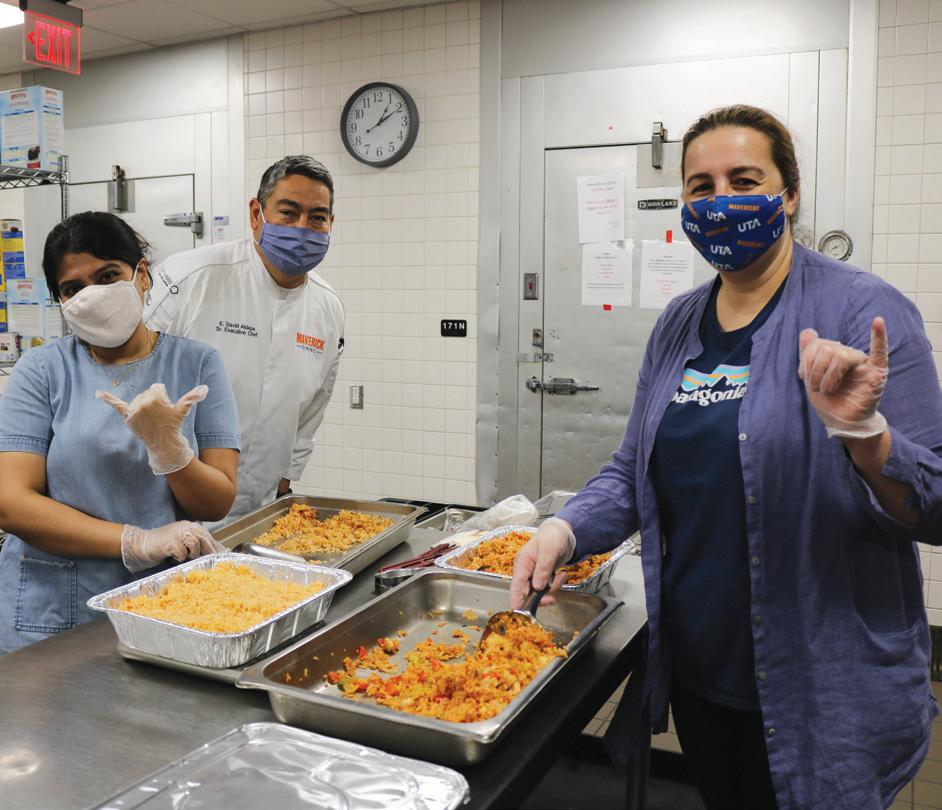
The EPA Food Recovery Challenge is a voluntary incentive program in which organizations and businesses set data-driven goals, implement targeted strategies to reduce wasted food and report results to compete for annual recognition. Actions to prevent and divert food waste include source reduction and industrial uses.
UTA, like many universities, prioritizes sustainability and food-waste reduction, reporting more than 1,000 pounds of recoverable food saved and donated to an Arlington food bank. Working with partners, like the on-campus composter, allows for greater progress. Every day, the back-ofhouse prep teams place all food scraps that can’t be repurposed into designated bins, picked up daily by campus composter John Darling, who also collects used coffee grounds. Once the scraps break down into usable compost, the Landscaping and Grounds Maintenance team at UTA uses it to nourish campus flower beds.
This collaborative goal takes a collaborative effort. Maverick Dining is grateful for the continuous support of the UTA community.
Solving for food insecurity, Chartwells at New Mexico Tech developed a circular food production and food-waste diversion program through a partnership with students and the local community. This program helps fill the void in Central New Mexico’s Food Desert.
It all started with a group of students and their garden club and grew into a full regional partnership with Chartwells Higher Ed, Socorro County Options Prevention and Education (SCOPE), the Rotary Club and local government to fund a community garden complete with irrigation lines, hydrants and tools.
The 12,000-sq. ft. garden with 8 raised beds is now staffed by more than 30 student volunteers and faculty members, producing everything from squash, hot peppers and tomatoes to peach, apple, fig and walnut trees.
“It creates a really great culture of appreciation and thoughtfulness. That was one of the main purposes of the garden, to create a community culture that puts sustainability at the forefront,” said Daniel Leatherman, New Mexico Tech’s Dining Director.

The garden expanded the program to divert New Mexico Tech’s food waste to local pig farmers. In the first semester, they diverted 2.6 tons of food waste to farm animals, 494 pounds to composting and sent nothing to landfills.

After the Aggie Dining team serves students at Texas A&M University, they then feed a group of exotic guests including peacocks, kangaroos, camels, zebras and wild cats. The We Feed Aggie Animals food waste initiative began in spring 2022, a program that donates food scraps from Duncan Dining Hall to the Winnie Carter Wildlife Center, an on-campus educational facility that houses wildlife. Produce scraps like pineapple tops, orange peels and lettuce cores can’t be consumed by humans but are considered a delicious treat for these animals. The Chartwells Higher Ed team has donated more than 3,000 pounds to date.
“The program has decreased the need to go to other facilities and increased the quality of produce we receive,” says Alice Blue-Mclendon, Director and Veterinarian of the Winnie Carter Wildlife Center. “Our next goal is to get enough scraps to feed our tortoises three times a week.”
“We really appreciate the dining team’s partnership, especially because we are based on donations, so this is a huge benefit,” said Reagan Heard, Aggie Dining Donation Coordinator and TAMU Student.
The We Feed Aggie Animals program continues to reimagine food waste as a resource to help support and further connect with the campus community.
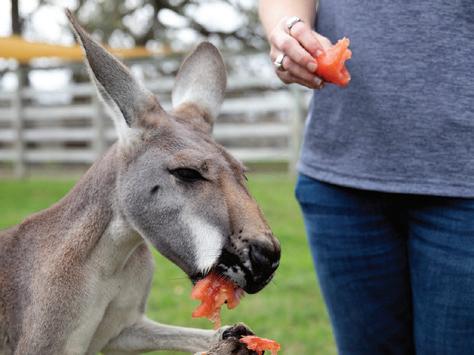

A food-scraps recycling pilot program with tremendous sustainability results launched in spring 2021 through a partnership between Eurest and a major medical research agency client in Bethesda, Maryland. In just 15 months, Montgomery County collected 25,000 pounds of waste from commercial kitchens for composting.
The composting facility is adjacent to Prince George’s County, making this a combined local effort between the federal medical research agency client, the onsite Eurest team and two neighboring Maryland counties. 35-gallon bins with durable, biodegradable liners are filled after every service, and three times a week Montgomery County workers take them to the composting facility. In tandem with Waste Not 2.0 tracking, this program allows Eurest and the client to reduce waste during food preparation while also composting unavoidable food scraps. The recycling program is expected to extend to other locations in the area.

Growing up on a farm, Scott “Isaac” Coles learned early on how to minimize a foodservice operation’s carbon footprint: fire up ovens only when needed, keep knives sharp to reduce scrap waste and set aside onion skins, banana peels and broccoli stems to feed barnyard animals.


The CulinArt Chef Manager at Stuart Hall School in Virginia strategically places Waste Not bins in the kitchen so staff can’t help but use them to collect production scraps. “We average about 20 to 30 quarts of waste per day,” he explains, which roughly equates to 4,000 quarts for the school year.
Creating synergy in the community, Coles transports scraps to an organic farm where they are turned into valuable compost heaps or fed to pigs, chickens and horses. Brown material created by the animals is critical to the compost mixture as a simple, natural and inexpensive option for nutrient-rich fertilizer.
Next, the dining team is exploring the launch of an interactive on-campus garden that would be instructional and eventually function as a source of produce for dining services.
Using kitchen scraps to grow new vegetables, CulinArt Senior Chef Manager Leslie DiNapoli at The Academy at The Golf Performance Center shows students how to avoid waste and, potentially, reduce future purchases as part of ongoing Earth Day celebration activities. Chef Leslie created a Kitchen Regrowth Garden Display by placing stems from celery, carrots, scallions and garlic in plastic grow boxes, immersing them in water, and exposing them to ultraviolet light.
“Students get to see what produce looks like during regrowth and it teaches them how to lower carbon footprint, be more sustainable, and become self-sustaining,” says Leslie. “It also shows how cool Mother Nature is—they can go about their day, stop by the kitchen and watch something grow. It helps liven the mood a little, especially when green leaves sprout during winter months.”
After a couple of weeks, the items showed various stages of progress, starting with the scallions. After a month or so, everything is transferred to soil boxes with organic fertilizer, where they take root and grow to full size, taking less time to reach harvest than a traditionally planted seed.
Taking any kind of kitchen scraps that ordinarily would go into the trash or compost and regrowing them into a usable product imparts valuable lessons to the boarding school students in Connecticut about waste, consumption, and the power of plants.

Bringing clients, customers, associates and suppliers together to raise awareness and inspire change around the critical issue of food waste, Compass Group hosted its sixth annual Stop Food Waste Day™ celebration on the last Wednesday of April. Launched in 2017, the annual day of action supports company-wide efforts to cut food waste in half across global operations by 2030. In partnership with their clients, Chartwells Higher Ed, Eurest and Compass Community Living

held a record number of Stop Food Waste Day events in dining locations across the nation like live cooking demonstrations and educational workshops. Compass Group chefs and culinary experts shared valuable tips and ideas, inviting everyone to play a part in reducing the amount of food that goes to waste.
The impact of Stop Food Waste Day was featured in several news outlets, including Charlotte, NC, and Nashville, TN, to recognize the importance waste reduction has on our communities. Magnifying this message, celebrity Chef Jet Tila, FoodTank and ReFed joined the conversation with more than 33 million social media users to champion the movement.
45 Compass chefs, representing more than 30 countries, published their waste-reduction recipes in a free digital Stop Food Waste Day Cookbook. Designed for home cooks to inspire change around the world, the cookbook includes a range of delicious appetizers, main courses and desserts, making it easy to create meals that give a second life to commonly wasted ingredients. It’s available on the Stop Food Waste Day website , which also includes information on how individuals, families and businesses can get involved in the #StopFoodWasteDay movement.
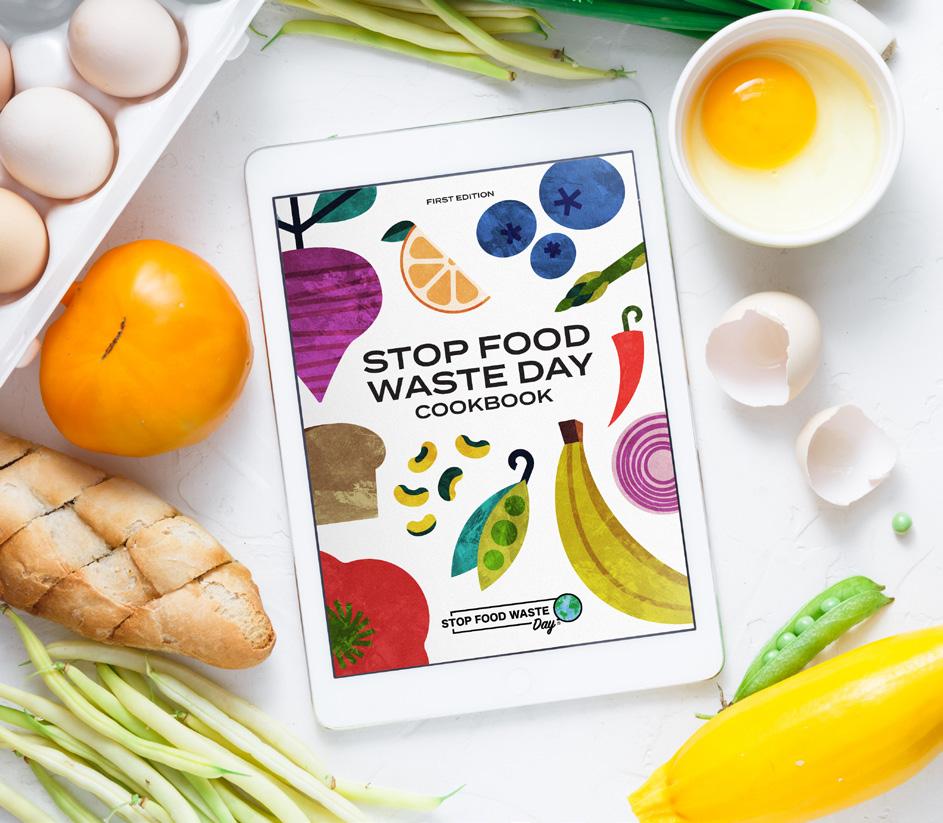
In an effort to improve its environmental impact, a Restaurant Associates (R/A) team in NYC launched a reusable container pilot at their tech client’s site, saving 1,600 pounds of disposables from the waste stream.
Employees are served food in the new containers instead of single-use, compostable alternatives and return them to one of many accessible bins around campus where the containers get washed and reused.

R/A received positive feedback from both their tech client and the employees who dine there. “Waste is such a huge issue in NYC and I'm so glad the company is getting behind this. I'm going to tell everyone to return their containers,” said one employee.
In partnership with their client, the R/A team will continue to collaborate, research and conduct pilots to develop solutions that make headway towards their goal of eliminating all single-use plastics.
Serving 39,000 meals in single-use takeaway containers each semester, it was a huge win for Chartwells Higher Education at American University to introduce reusable containers to its main dining facility. The OZZI O2GO Container will divert an estimated 2,600 pounds of waste from landfills.
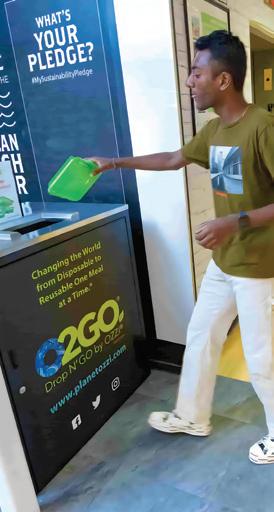
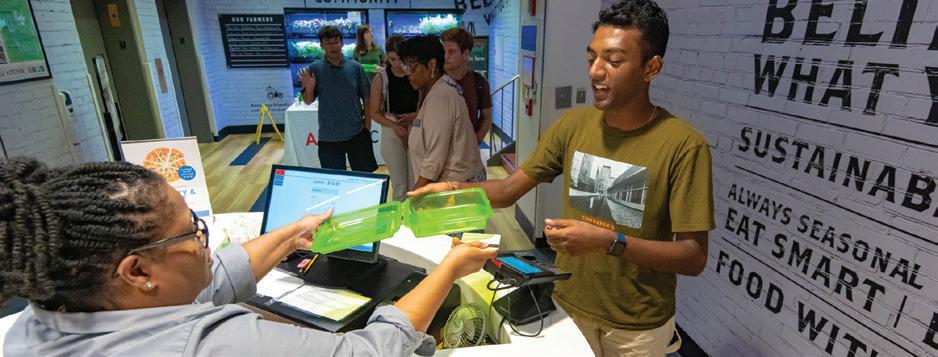
“As the dining provider on campus, we are committed to supporting our partner’s efforts to achieve their zero-waste goals,” said Monalisa Prasad, National Director of Sustainability for Chartwells Higher Education. “The introduction of OZZI’s reusable to-go containers is just one example of how we are working together to reduce waste at its source for a more sustainable future.”
With the help of Chartwells Higher Ed, the university received a $25,000 grant from the District of Columbia Ditch the Disposables Award Program , allowing the university to provide a free reusable container for each student this semester.
“AU is committed to acting on its zero waste goals and to further reducing its impact on the environment,” said Megan Litke, Director of Sustainability for American University. “The use of reusable containers helps reduce the amount of waste sent to the landfill and reduces emissions from the creation, and disposal, of single-use items. It also supports the District in its goal to reduce single-use food service items across the city.”
Chartwells Higher Education in collaboration with its campuses, purchased and used 87,125 OZZI containers in 2022, diverting thousands of single-use containers from going into landfills. As the dining provider for over 300 colleges and universities across the country, Chartwells is committed to supporting its partners' efforts to achieve their zero-waste goals. The introduction of OZZI’s reusable to-go containers, a partnership that started several years ago, is just one example of how they are working together to reduce waste at the source for a more sustainable future. The use of reusable containers helps to reduce the amount of waste sent to the landfill and in turn reduces emissions from the creation and disposal of single-use items.

Disney’s Corporate Real Estate Operations NYC knows food-waste reduction is an impactful area of opportunity and engaged Think Zero, LLC to conduct onsite waste audits. The FLIK team participates in a quarterly training course on waste reduction to enhance manager and associate knowledge of how their operational efforts affect climate change. An early adopter of Waste Not 2.0 , the team diverts 99% of food waste, has a food donation partnership with raeri and utilizes onsite composting.
Supported by the NYC Disney Green Team Employee Resource Group , FLIK and Disney’s Corporate Real Estate Operations NYC have reduced the use of plastics by approximately 62,000 bottled beverages, and completely eliminated plastic serving containers, straws and bags. Discounts are given to employees who bring their own cups, containers and reusable bags while marketing creates educational awareness on how individual contributions can impact climate change.
Their latest effort to reduce carbon emissions is led with culinary innovation at a new station called Common Ground, where ingredients are locally sourced to create plant-forward and sustainable meals served on bamboo dishes. With a curated focus on global flavors and food trends, daily sampling allows curious employees to try something new while inspiring dialog around lower-carbon food choices. Developing this station gave FLIK chefs the opportunity to see the value of food as an avenue for creativity while engaging guests to support the environment.

The built environment is responsible for 37 percent of all global energy-related CO2 emissions and 36 percent of global energy use.
Across the facilities services that Compass Group provides, we work with individual clients to implement energyefficient and greener business practices in alignment with their ESG and sustainability targets. While the cumulative impact of these efforts is captured and reported on by the client, the benefit to people and the planet is easily seen, experienced, and measured.
 Source: 2021 Global Status Report for Buildings and Construction, Media Assets, Key Messages
Source: 2021 Global Status Report for Buildings and Construction, Media Assets, Key Messages
Robots are saving electricity and using fewer chemicals to clean hospital floors, all while improving the perception of ‘clean'. Each robot works two shifts, seven days a week at four hospitals in the New York City Health + Hospital (NYCH+H) system.
“These machines are user-friendly, error-free and use less chemicals than other cleaning processes,” said Marissa Janneire, Senior Regional Director of Operations at Crothall. “They make our facilities safe for patients in our community hospitals. That’s important. When people see a clean hospital, they are more likely to feel safer when coming here for health care.”
For the leaders of NYCH+H, clean floors are equally important in their 'first-impression' lobbies, hallways, public spaces, elevator banks, clinics and operating rooms. Because the public enjoys watching the robots at work, they often clean lobbies and other high-traffic areas during the busiest parts of the day.
“We want the public to see that we are using the best, safest technology to bring the Power of Clean to our hospitals,” Janneire said. “It really helps to influence the perception of clean.”
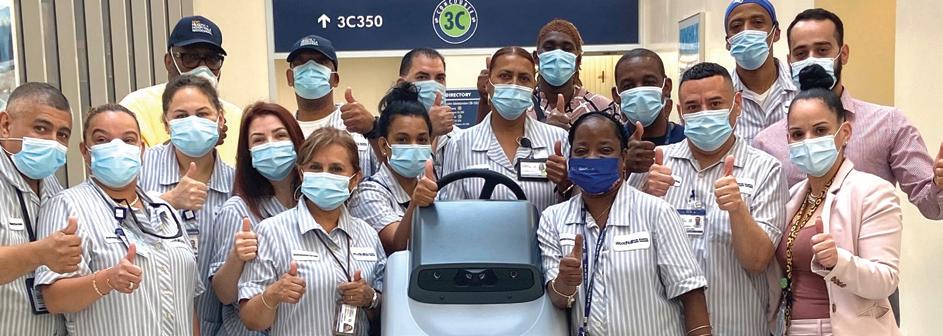
While the robots have several advantages, they do not replace frontline associates. Instead, they become one more resource for Crothall to augment a full staff’s efforts in cleaning and disinfecting an entire hospital each and every day. The machines are also available to help if COVID-19 or other contagious diseases re-emerge and fewer workers are available to work. An automatic scrubber helps the entire workforce.
The new machines aid the environment in two ways. First, they reduce the need for electricity with corded equipment. Next, by using an EPA-registered Safe Choice chemical, Medama® Super Shield, they clean floors using less chemicals.
One of them is named “Omega.” Another will be named in an upcoming hospital ceremony. They are tireless workers helping Kings County
Hospital Center and Woodhull Hospital in Brooklyn, Bellevue Hospital in Manhattan, and Jacobi Medical Center in the Bronx become more sustainable. A team from the manufacturer, Nilfisk, surveyed each hospital and developed a road map for the machine to operate independently.
Crothall Regional Director of Systems and Programs Paul Fratta explains these diligent little workers are extremely efficient, controlling the amount of solution dispensed while the vacuum and drying tools work to minimize the length of time a floor takes to dry. In contrast, people who clean floors often apply too much chemical in an attempt to increase the product’s potency, which can inadvertently flood floors and increase the amount of chemicals disposed into water sources.
Crothall continually deploys sustainable cleaning products in hospitals that also improve patient safety. One of the latest are generators that produce electrochemically-activated disinfectants in place of harmful chemicals, now in use at several healthcare facilities including Boston Medical Center and New York Presbyterian Hospital.
The device creates a disinfectant that eliminates the toughest bacteria, viruses and fungi. It contains hypochlorous acid (HOCI) which is created when chlorine dissolves in water. The cleaning product is chemical-free, non-toxic, biodegradable and safe for patients. Plus, it’s generated onsite which eliminates the need for packaging, shipping and storage.

“This new, sustainable cleaning product has been proven effective against a broad range of bacteria, mycobacterium and viruses,” says Eric Anderson, Crothall’s National Director of Standards, Innovation and Global Support. “By using it widely throughout healthcare facilities, this product is another major step to improving the safety of patients and medical staff at some of the nation’s largest hospitals.”
This product is safe to clean several surfaces, including floors, which are often damaged by other chemical disinfectants. It can be disposed of through hospital drains without risk to patients, plants, aqueous systems or marine life. And it doesn’t react negatively with other chemicals, a common risk with competitive products found in healthcare settings.
The impact is significant. Hospitals use an average of 1,300 gallons of this disinfectant every 30 days instead of non-sustainable products. Annually, Presbyterian Hospital at Columbia University uses 41,000 gallons of the new, non-toxic disinfectant which means collectively hundreds of thousands of gallons of water with toxic chemicals are eliminated from the waste stream.
New technology to provide sustainable solutions is championed by Crothall’s Environmental Services (EVS) team, improving workforce productivity and patient safety. Adopted across 80 U.S. hospitals, Virtual MGR ’s HealthClean brings transparency to the team’s workflow using cloud-based workforce automation software. The technology ensures a fair and equitable workload that improves both labor and environmental sustainability.
Using mobile devices, each frontline associate arrives at their assigned room with an optimized schedule of cleaning, disinfection and patient interaction. With real-time visibility of frontline associate progress, EVS managers can balance the workflow of their operation digitally.
Virtual MGR also supports maintenance-issue reporting, intelligent and strategic rounds with SmartCheck, patient engagement and follow-up, including associate support, competency measurement, and proactive interaction with key client stakeholder needs.

Once deployed, efficiencies include the ability to attain metric-based outcomes such as intelligent reduction targets, sustainable retention opportunities, associate assignment reallocation as well as the ability to immediately address staffing challenges by using real-time analytics to make the appropriate pivots.
Inclusive of longer-term benefits, the solution analytics support bed throughput, a term used for the average number of inpatients treated per bed, parallel to turn-time management, which is critical to client admissions and patient retention.
Communications among EVS teams at all hospitals were previously documented and transmitted manually, but digitized technology reduces paper waste.
“ Virtual MGR provides enormous benefits to our workforce,” said Joseph Talamo, Regional Director of Operations. “We can streamline our workflow to be more efficient while also meeting all compliance regulations.”
Patient satisfaction scores have improved with this new technology at hospitals like Allegheny General Hospital in Pittsburgh. Understanding how work is distributed and completed provides other advantages.
“ Virtual MGR has been a great addition to support the operational management of EVS at our hospital,” said Mark Nussbaum, Chief Operating Officer at Allegheny General Hospital. “This technology has allowed us to optimize our workforce and, in real-time, track and adjust throughout the day.”
Crothall is on track to have its EVS teams use Virtual MGR in more hospitals, including ambulatory centers and medical office buildings.
“Hospitals spend millions of dollars annually to disinfect patient rooms,” said David Hill, Crothall’s Regional Director of Operations. “ Virtual MGR provides hospitals a sustainable advantage that improves the speed and quality of disinfection and cleaning while saving money.”
Crothall is a proud partner of Virtual MGR , recognized as one of the fastest-growing private companies in the United States, by Inc. 5000 in 2022. Click here to see a short video about how Virtual MGR works from the Inova Health System.
Crothall Healthcare was named a Business Intelligence Group's (BIG) Sustainability Leader for bringing new technology and sustainable cleaning products and methods to clients. With improved patient-safety outcomes in mind, a product review committee works closely with product manufacturers and major US hospitals to decide which items meet standards for safety and sustainability, and are worth testing for the award. Disinfectants and new technology that can reduce Hospital Acquired Infections (HAIs) while replacing the use of potentially toxic chemicals or eliminating waste receive top priority.
ESFM’s green cleaning practices are driven by a panel of subject matter experts who evaluate new technology for targeted cleaning needs unique to each client’s facility. Through detailed research and vigorous testing, certified products are vetted prior to recommendation. Followed by product efficacy, one of the top questions on the list is, “how does this product contribute to delivering more sustainable outcomes?”

This detailed overview ensures Green Seal-certified products are utilized while electricity and water usage are minimized, efforts that support ESFM clients pursuing LEED certification from the U.S. Green Building Council. ESFM associates wear lightweight battery-powered vacuums that use less electricity than traditional plugin models. Reusable microfiber cloths are the standard because they are more effective at disinfecting surfaces than disposable alternatives and reduce waste headed to the landfill.
In December 2021, the eClean program was certified by the worldwide cleaning industry association International Sanitary Supply Association (ISSA), earning the highest level awarded: the Clean Industry Management Standard - Green Building (CIMS-GB) and CIMS certifications with Honors.
“With Honors” means ESFM’s innovative solutions meet additional criteria to earn the special designation, putting ESFM in an elite category of CIMS-certified cleaning service providers.

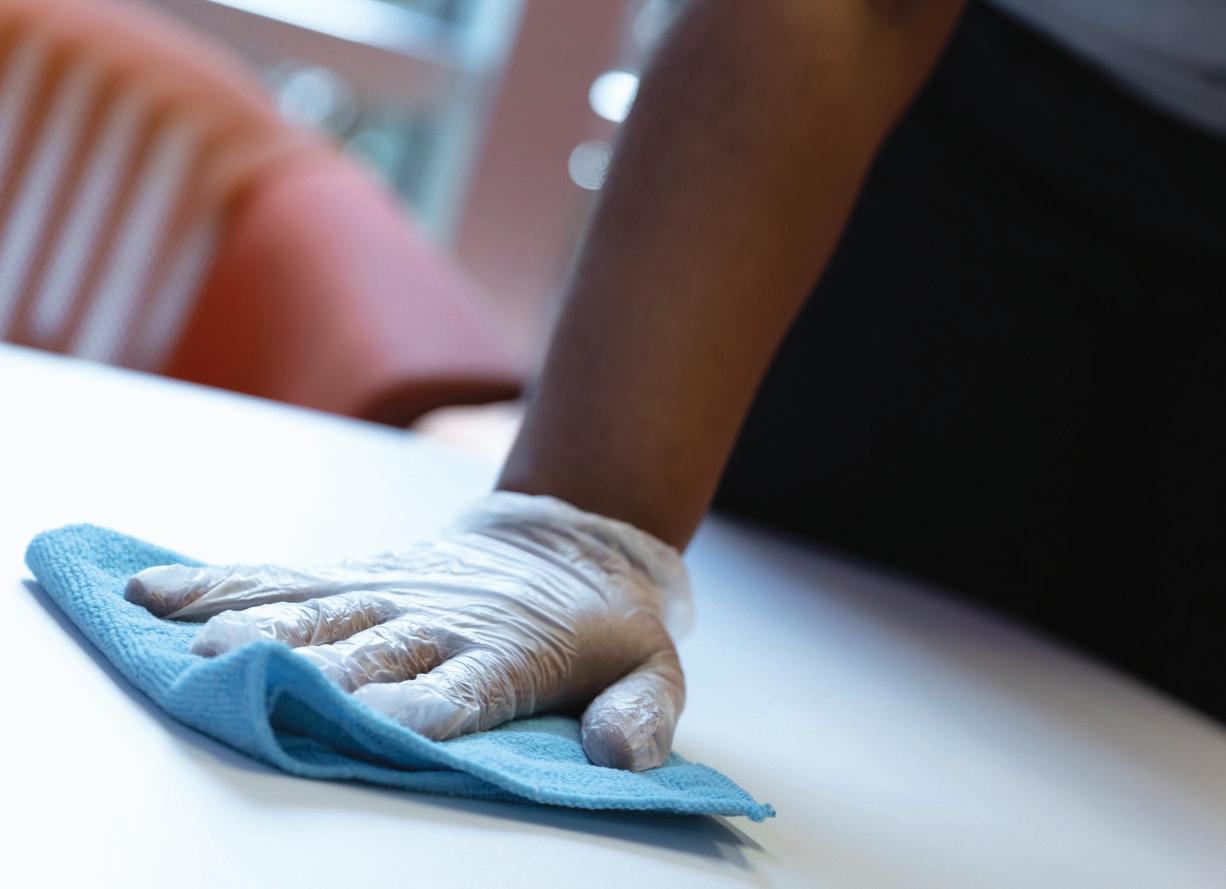
The Green Building designation affirms ESFM’s dedication to sustainability and keen focus on executing green cleaning procedures.
The CIMS-GB certification means the organization meets the U.S. Green Building Council’s green cleaning criteria for Leadership in Energy and Environmental Design (LEED) buildings.
Earning this certification has ripple effects for ESFM clients, allowing them to achieve points under the U.S. Green Building Council’s LEED for Existing Buildings: Operations and Maintenance (LEED EB: O&M).
Clients can trust they are working with a verified Integrated Facilities Management (IFM) provider that is equipped with the right tools and operating procedures to maintain clean, healthy spaces while remaining committed to protecting the future of our planet.
ESFM is harnessing its expertise to help clients reduce their carbon footprint, meet net-zero goals and ultimately contribute to a cleaner, healthier future. The sector assembled a team of in-house experts to lead a self-performed solution that solves for critical energy management needs from comprehensive building optimization audits to strategic capital improvement initiatives. Results are then prioritized by the benefit to the client and planet.
“We know facility managers are facing challenges which may include aging buildings, increasing utility costs and a drastically changed workplace since the pandemic,” said ESFM Vice President of Technical Services and Energy Solutions John Ramsden. “Our team is outfitted with experienced operators and certified professionals to save our clients money while supporting their carbon reduction commitments.”
The new Technical Services and Energy Solutions team builds on ESFM’s holistic sustainability approach and includes strategic asset optimization, critical environment compliance, reliability engineering and consulting, technical services standardization and training.
At a client location in New Jersey, ESFM deployed nine projects that significantly reduced energy and operations costs. One approach involved optimizing the compressed air system and analyzing energy data using an ultrasonic detector to locate and repair leaks. The result: a 25% increase in usable air capacity and 2.5+ million kWh reduction in overall energy usage per year. The team also reduced waste hauler pulls by 70% using trash compactor smart sensors and saved 1.2 million gallons of water per year by recalibrating bathroom sensors.

“Creating sustainable solutions is not new for ESFM. What makes this a significant part of our company’s future is the opportunity to partner closely with our clients, and create positive change for the workplace and the planet while impacting generations to come,” said John.
Data utilized from the energy and sustainability audits help identify efficiencies and optimization strategies, further benefiting client capital improvement planning and execution.
The team enables ESFM to self-perform energy and technical services at a higher level, saving clients money previously spent on third-party specialists while identifying potential millions of dollars in annual cost savings for clients across the United States.
The highest zero-waste rating possible was awarded to a life sciences client in California by Green Business Certification Inc. after ESFM spearheaded a waste-reduction initiative. The project resulted in achieving and maintaining Platinum TRUE Certification, or Total Resource Use and Efficiency for zero waste, the first company of its kind to obtain this certification--which rates how well facilities perform in minimizing non-hazardous, solid wastes and maximizes efficiencies in the use of resources.
ESFM’s zero-waste journey required a strong commitment from both the onsite team and client as outgoing waste designated for landfill must remain less than 10% of the total.
• 11,500+ pounds composted
• 16,500+ pounds recycled
• 30,000 pounds diverted or reused
• $ 18,000 annual savings
Running a TRUE platinum-certified operation includes meticulous weighing of all waste — cardboard, compost, trash — with careful evaluations floor-by-floor to ensure everything is disposed of properly and easily for the building occupants to minimize their environmental footprint. Josh Bradley was the architect behind the initial implementation and describes the process as a “culture change.”
“We started with a motto: ‘Know before you throw.’ People bought in! They took the time to sort their waste before throwing it out,” said Josh, Resident Regional Director. “As companies are looking toward their zerocarbon goals, diverting their waste can be an easy win — it’s something you can do right now. It just takes effort.”
Waste is logged and weighed twice a day with maximum effort to ensure what can be recycled, is recycled. Associates also inspect every bag before it is sent out of the building, rerouting any misplaced items.
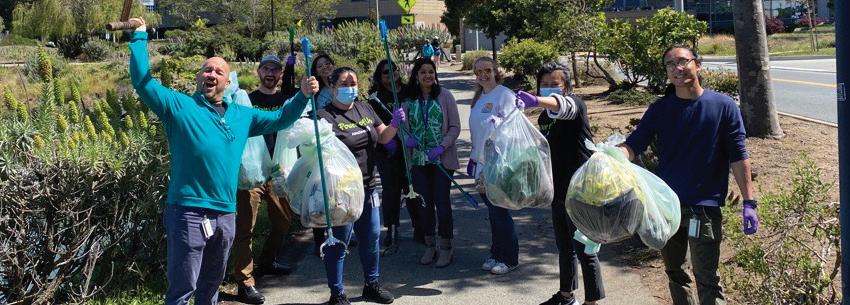
Cardboard and general recycling are sorted for pickup while other common items like pallets, rubber gloves, foam and metals are diverted from the landfill using unique vendors.
“We have to take it personally in order to succeed at these sustainability programs.” said Carla Gonzalez, ESFM Operations Manager. Carla added that as associates see the positive results of their work, they embrace the TRUE commitment. “When they see the impact they are having, it empowers our team and motivates them to be engaged.”
Creativity is key and even looking at seemingly small things can have a large impact. For example, a Lancer Washer device was purchased to sterilize the safety glasses worn daily with an acid wash, creating greater operational efficiencies and cutting the cost of purchasing new glasses.
Waste bins are clearly labeled and signs throughout the building make it easy to understand where to dispose of each item, including digital boards with videos that show where waste goes.
With water conservation efforts on high in California, the ESFM engineering team implemented a water diversion system. They drilled through concrete to reroute water rejected by the purification system as unfit for use in the building to the roof for use in the cooling system. This new system annually saves 120,000 gallons of water per year from going to waste.
In addition to TRUE Zero Waste certification, the site’s landfill diversion tactics are also My Green Lab certified at the highest level, green. Considered the gold standard for laboratory sustainability best practices worldwide and recognized by the United Nations Race to Zero campaign, My Green Lab involves a commitment to assess and change practices based on recommendations in more than 14 categories including general equipment, cold storage, purchasing, water, recycling & waste reduction, materials management and travel.
Operating in the “green” means, in part, buying items that can be recycled to specialist vendors who take the used products, recycle them, and then sell back the consumables to create a circular economy that is better for the environment.
It can be a challenge to reduce water and power use in labs where temperatures have to be maintained for storage and some machines must remain on. But having champions for the environment on the team does make a difference. Quizzes, with prizes, are used to educate employees on best practices. Investments are made in top-ofthe-line equipment that requires less energy.

ESFM is proud to be part of an international firm that invests in tomorrow with actions today, taking meaningful measures to reduce environmental impact. Teams are committed to incorporating product, equipment and service innovations that are better for the planet and for customers. Subject matter experts support LEED, WELL Health-Safety and Wildlife Habitat certifications.
With creativity and dedication, each ESFM team member plays a critical role in contributing to a thriving ecosystem and supporting environmental, social, and governance (ESG) priorities shared by clients and many of the country’s top employers.
Each summer, sheep join the scientists on a life sciences campus in New Jersey. The wooly creatures chow down across several acres, keeping poison ivy and grass from interfering with the facility’s solar panels. While the sheep enjoy a vacation from their farm, ESFM discontinues the use of chemicals and reduces fuel emissions that would have come from the parked lawnmower.
At another life sciences client location, ESFM’s team manages a biodiverse garden, attracting pollinators like honeybees. In addition to benefiting the local ecosystem, native wildflowers require less water and maintenance, resulting in reduced emissions from landscaping equipment.
ESFM’s conservation efforts for an oil & gas client helped them receive the Gold Conservation Certification from the Wildlife Habitat Council, the highest tier of 700 WHC Conservation Certification programs. These programs take corporate sustainability goals and objectives and translate them into tangible, measurable on-the-ground actions. As the neighbor to a wildlife preserve, unique solutions were implemented:
• Snake relocation program
• Exterior solution to reduce hummingbird collision
• Pollinator garden with migration resting area for monarch butterflies
ESFM continues to drive its commitment to sustainability with operational enhancements:
• Hiring and promoting subject matter experts
• Creating a National Sustainability Council comprised of Compass Group Facilities Management professionals representing healthcare, corporate, and education business lines

• Becoming a Keystone member of the International WELL Building Institute (IWBI)
With this added support, ESFM has the ability to customize sustainable solutions to support clients’ CSR commitments, including zero waste, energy optimization, and reducing their carbon footprint.
As the only facilities management company 100% focused on education, SSC Services’ clients know learning and development is taken seriously for associates, clients, students and the communities served. Over the last year, operations and grounds teams worked hard to find unique ways to enhance sustainability practices through education and enrichment. The latest initiative features educational signage for Edible Gardens, Apiary Pollinator Gardens and Bioswales at our partner schools.

Edible landscaping replaces the rigid structure of hedgerows with vibrant, colorful, interactive and dynamic life. At the University of Arkansas Fort Smith, Grounds Project Manager Brandon Haley worked with the student garden club to install the new landscape, a garden that provides hands-on educational opportunities to students, staff and community throughout the year. SSC created signs to share the health benefits of organic herbs and vegetables, encouraging people to pick and eat them. Surplus harvest is given to the Lion’s Pride Food Pantry on campus to further support the community of Fort Smith, helping address food insecurity and provide fresh, healthy options to families in need.
At first glance, the University of WisconsinSuperior Apiary appears to be a field covered in dandelions and unkept weeds. What many don't know is that these plants serve a critical purpose. Dandelions are one of the first bloomers of spring and are purposefully left untouched to provide the 7 hives of Russian Bees an early pollen source. The SSC Grounds, Communications and Marketing teams partnered with its Graphics Shop and the university to create messaging that explains the purpose of the native flowering species surrounding the Apiary. Visitors learn the difference between pollen and nectar plants, using images of each to identify them while enjoying the sights of the Apiary.
Many people don't notice the presence of bioswales around them. Typically in parking lots, bioswales are natural water filtration systems that help keep contaminants out of waterways. As rain cleanses the parking lot's surface, runoff enters the bioswales. SSC launched its most recent campaign around bioswales at the University of Wisconsin-Superior this past fall with a diagram installation showing how water infiltrates the soil and breaks down the pollutants before runoff rejoins the water table.
At SSC, the grounds teams continuously seek ways to showcase their commitment to a sustainable environment through water conservation methods, biodiversity, soil stewardship and community education.
Passionate about helping people with physical or mental limitations, Unit Director at the University of Mary Hardin-Baylor (UMHB) Sohn Stancell is creating a supportive work environment. Sohn works with career placement programs both as a volunteer to assist high school students with interview skill development and as a partner to organizations interested in onboarding individuals with disabilities to his team. Over the years, he’s had up to 14 associates with disabilities work for him at any given time.
Through Sohn's efforts, associates with disabilities develop confidence and a sense of purpose in the workplace, proving to be a real asset. His overall team enjoys the feeling of making a difference and loves to know there are employers who will help their family members with disabilities. Sohn speaks to both students in the master's program on campus about how to best match individuals to the perfect task, and to employers in the community about the benefits of hiring individuals with disabilities.
Proud moments include watching a disabled student work in the food court during the lunchtime rush to wipe windows and clear trash, and witnessing a blind student pass the test of installing a shower curtain in on-campus housing.
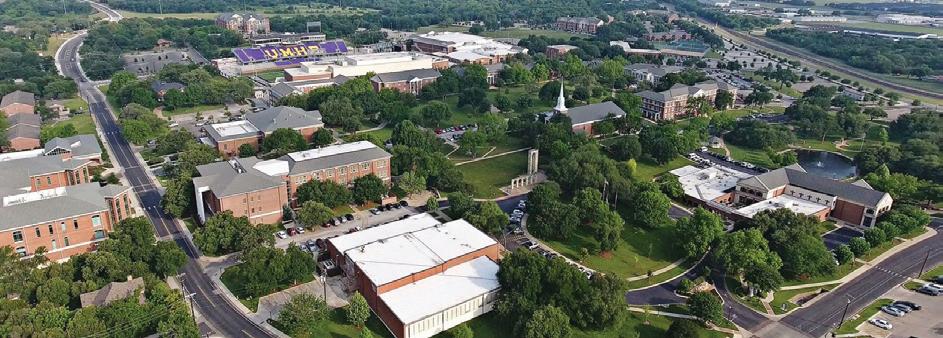
Sohn shares how he creates an inclusive learning environment for people of all backgrounds and abilities.
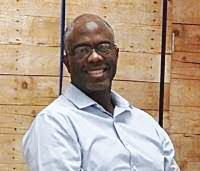
How do you find programs to engage with individuals who may not apply for a job without a relationship already in place?
Many of our connections start by word of mouth, plus we build relationships with schools and state hiring agencies. I also look for people or agencies who are willing to do a meet-and-greet on the same day.
How do you adapt a job to the person?
I typically evaluate where the person can help the most. I see each person in a different light and, depending on their personality and ability, determine where they can make the best impact and find the most satisfaction. A minor task can go a long way, from emptying trash to cleaning the entrance glass or wiping tables.
How do you guide the supervisory team working with people with disabilities, especially if this is new for them?
I start by walking them through each individual's disabilities and how they can assist us. I also let them know if they are sensitive to certain noises or smells. I remind them that our jobs are to teach and repeat until the person masters the tasks, and I keep reminding them as they work.

What
COMPASS GROUP is doing
Society is demanding that companies, both public and private, serve a social purpose. To prosper over time, every company must not only deliver financial performance, but also show how it makes a positive contribution to society.
 Source: Larry Fink, Chairman and CEO, BlackRock
Source: Larry Fink, Chairman and CEO, BlackRock
At Compass, we are committed to doing the work that is needed, not only to strengthen our company, but to strengthen and make a lasting impact on the communities we serve.
AMIkids is an organization that works diligently to improve the lives of incarcerated youth. Through mentorship and education, AMIkids rehabilitates troubled youth and guides them toward a positive future, helping struggling children and adolescents reach their full potential.

This past year Canteen chefs, associates and AMIkids compiled recipes into the Made with Love: The AMIkids Cookbook to raise funds for the White Pines location. Vice President of Sales Cory Neff and teams across Canteen donated their talents to design, print, sell, and distribute the cookbooks both online and in person.

“Canteen believes, as we do, that if we get our youth to experience new opportunities it will open their minds to what they can accomplish,” said Executive Director LaQuentin “Que” Irvin. “Getting them out of their current situation and into new environments shows them how much more they can accomplish.”
Beth Rainey, who works for Canteen’s Southeast Division, says her experience with AMIkids White Pines has been life-changing. She and former colleague Sandy Goodson, who retired from Canteen earlier this year, are now chair members on the AMIkids White Pines board. Rainey urges others to involve themselves with organizations that change you for the better and make a difference in others.
With a commitment to help improve lives for the better, UNC Charlotte Dining opened the first Change Please Café in the United States on its Center City campus. Started in the United Kingdom, Change Please is a coffee program where 100% of its profits give single mothers and those facing homelessness a fresh shot at life. Every cup of coffee sold helps by offering training for a living-wage barista position, guidance on creating a bank account, and help with securing a home while also providing psychological support.
“We are located in the First Ward of Charlotte just outside Uptown. Homelessness is an issue near and dear to the Dubois Center,” said Morgan Smith, Director at the Center City Dubois Building. “Annually, the building hosts programs geared towards helping those impacted in our community. For our building to be able to work with Change Please is incredibly meaningful.” Since the partnership began with Compass Group, Change Please has helped 85 people transition out of homelessness, and it continues to expand.
The Market at Dubois serves Change Please coffee alongside a rotating grab-n-go Jack & Olive menu. Inside UNC Charlotte’s Science Building, the offering includes a range of delicious, special-grade coffees and convenient snacks, sandwiches, salads, and impulse items.

“ Change Please is incredibly proud and appreciative of the partnership with UNCC. The support and passion for the Change Please mission has been incredible, and we look forward to delivering more great coffee and impact as the relationship develops with Compass Group. The profits generated from coffee sales since opening the first site earlier in 2022 have already funded some of the coffee equipment for our training academy. This means we are able to support and train more people out of homelessness and into onward employment just through selling Change Please coffee on campus.”
- Ryan McMillan, Director, Change Please USA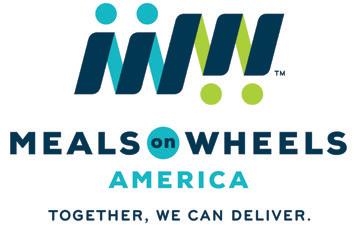
When her grandmother broke her hip and needed Meals on Wheels , Mandy De La Cruz was dismayed by the quality of the food being delivered. As a Director at Morrison Living, Mandy wondered how Morrison could take this over to ensure the seniors are getting higher-quality meals.

With full support from the administrator at The Commons Continuing Care Retirement Community , the dining team won the bid to extend their service to seniors in the surrounding Enid, Oklahoma community. After Mandy was promoted, the Morrison Living team continued to grow the program.
Current Director Noeme Hodges works with Registered Dietitian Sarah Thornberry to oversee menu compliance and with Chef Bobby Nance to create meals from scratch. These nutritious meals receive rave reviews and were even featured in the local newspaper. Client participation has steadily increased, and the team now serves more than 200 additional seniors every day.
Socks are the #1 most needed, yet least donated, item in homeless shelters. In October 2022, Compass One Healthcare collected and donated over 170,000 pairs of socks to homeless shelters across the country as part of their “Socktober” give-back initiative. That’s 30,000 more pairs than last year, and along the way, they raised the spirits of their teams and the communities in which they serve.
Crothall’s Environmental Services at Cincinnati Children’s and Morrison Healthcare’s Southern Division first recognized the need in 2020 and took action. Inspired by their efforts, Compass One took this initiative company-wide the following year, partnering with clients and the community to help prepare unsheltered Americans for the winter months.
“Our associates, hospitals and health system partners consider each pair of socks a small ray of hope for those in need,” said Andy Maus, Senior Vice President of Human Resources at Compass One Healthcare.

To impact even more communities, Compass One worked with The Salvation Army as their national donation partner in 2022. “My team is so excited to be participating in Socktober again this year,” said a team manager. “The energy in our unit was palpable last year and there’s no better feeling than giving back to the people who need it most.”

As the decades-long dining partner for Washington University in St. Louis, the Bon Appétit Management Company team makes the University’s ethos to serve the greater good an integral part of how they approach operations and community support. In late 2020, Regional Manager David Murphy deepened this commitment after joining the board of nonprofit Propel Kitchens , whose mission is to utilize nutrition, food industry training and education as tools that equip residents to combat persistent economic and health inequities.
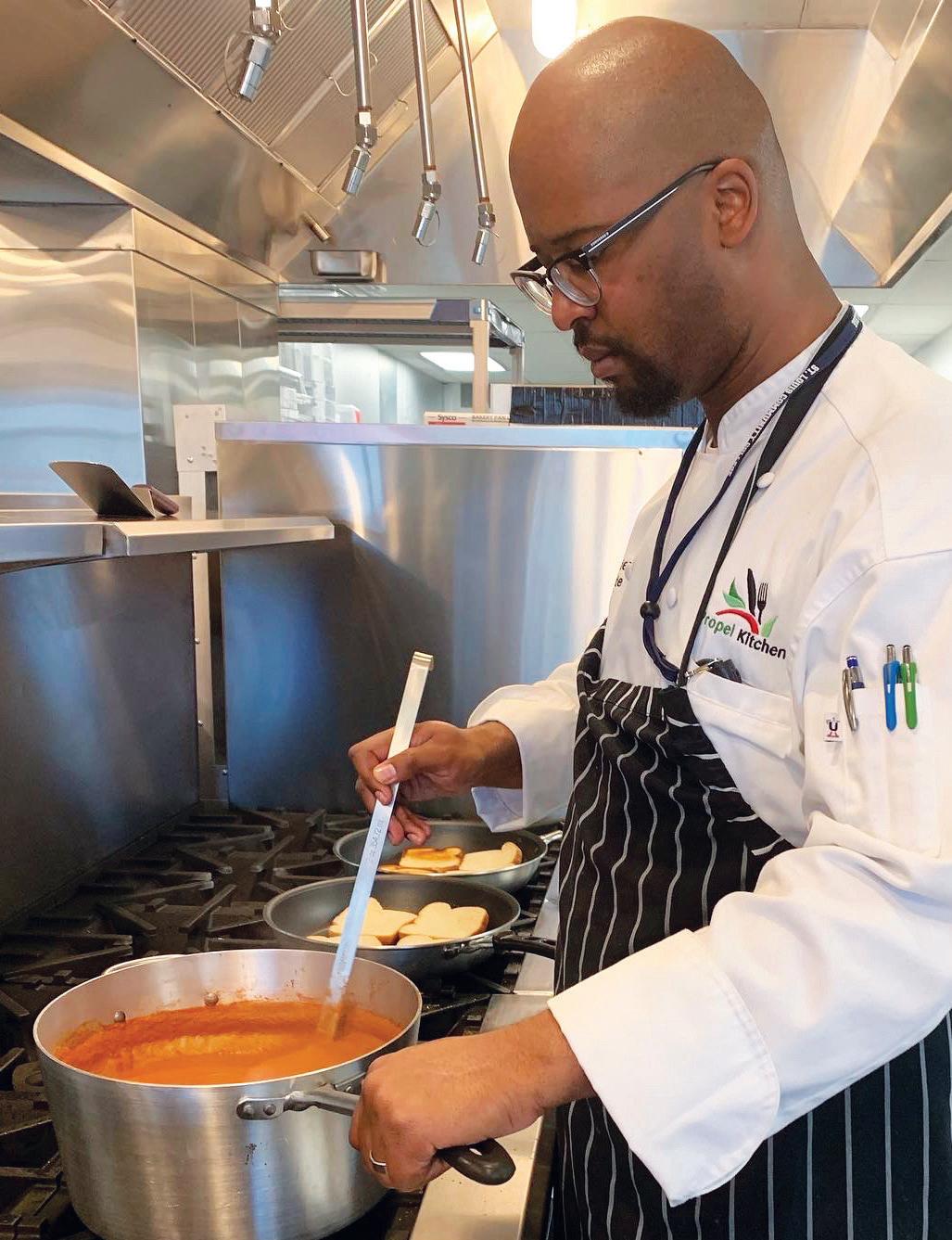
“The pandemic provided a spotlight on inequities that exist in under-resourced communities and we work to eradicate them with food, and the preparation of food, as a model for change,” said Yvonne Sparks, Propel Kitchens Board Chair.
David knew this model for change would be meaningful to WashU. In partnership with Propel Kitchen, he asked Bon Appétit to launch a commissary and a fresh, affordable prepared foods program. Following a successful launch, expansion ideas stemmed from students who expressed a desire for increased plant-based meals across campus. Bon Appétit could start sourcing products from Propel’s two social enterprise subsidiaries, Plant-based Artisan Network and WiseChoice Meals™ , streamlining the busy production schedule with locally produced specialty foods and a wide selection of fresh, healthy and affordable grab-and-go options.
Taking it further, Propel could begin producing drop-off catering on campus, a request from budget-conscious faculty and administrative teams. Bon Appétit and Propel would collaborate to create a Sous Chef Apprentice Program with mentorship from WashU culinary staff, ultimately leading to Bon Appétit at WashU becoming an employer of choice for graduates of Propel Kitchens.
The University embraced the idea. In the summer of 2021, Propel Kitchens cut the ribbon to open a 5,000-square-foot culinary space and began building out the kitchen and staff. The commissary operations soft-launched in December and the first class of students officially enrolled several months later.
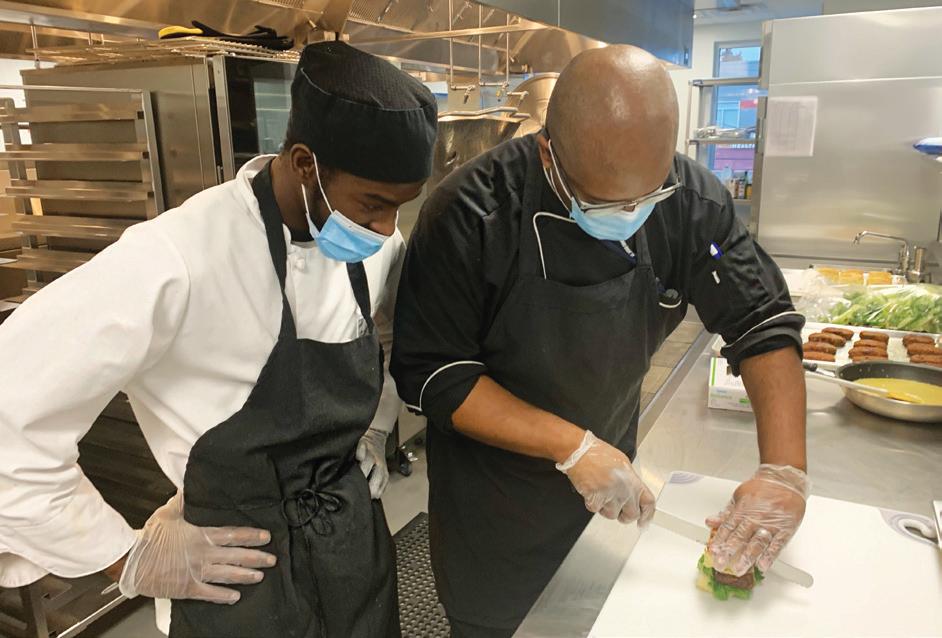
“The partnership with Bon Appétit has been the catalyst needed for Propel Kitchens to gain its footing in the commercial food space,” says Kisha Lee, Executive Director of Propel Kitchens.
While the phased project continues to grow at WashU, Propel Kitchens is continuing to expand its impact on communities throughout St. Louis.

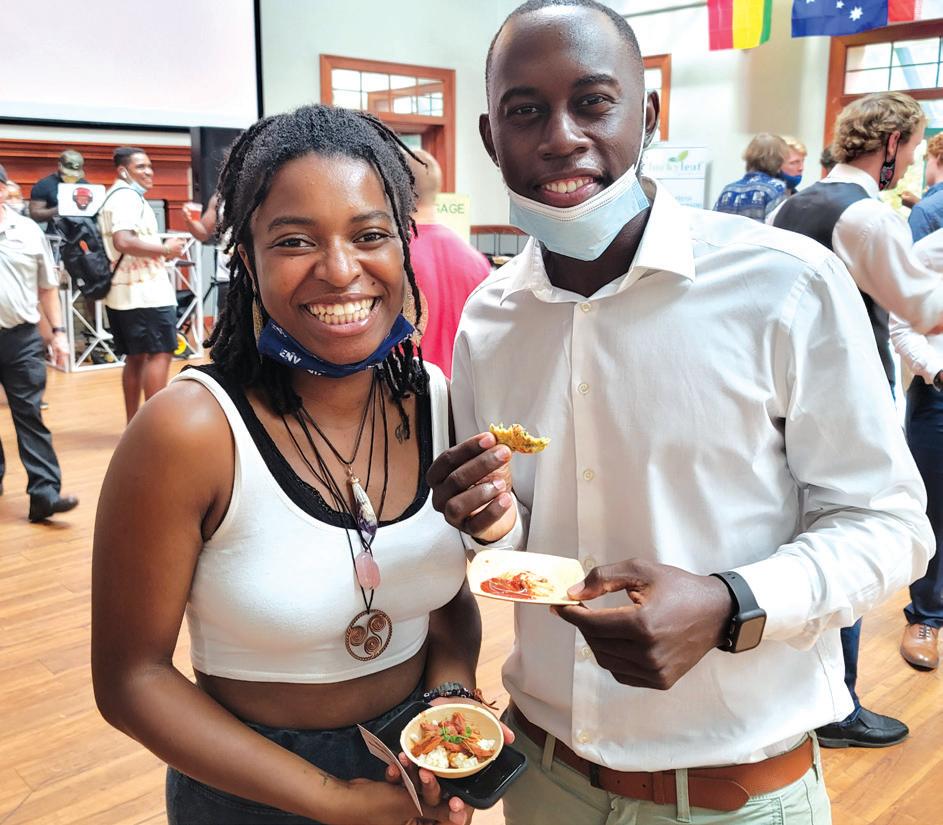
The Joy-Ful program is a year-long, national campaign designed by Chartwells Higher Ed to welcome students back to campus and rekindle a sense of community. After a school year largely defined by separation, Joy-Ful helped new and returning students connect and celebrate campus life with engaging and uplifting moments of joy centered around food. Throughout the school year, students were invited to events taking place in unison across school campuses nationwide.
As part of Joy-Ful , Chartwells campuses hosted multiple givebacks. The results:
• 100,000+ meals donated to fight food insecurity
• 400+ different organizations benefitted
• 530,000 random acts of kindness completed
The signature event, Grate-Ful , was designed to show gratitude for the planet, fight food waste and advance sustainability on college campuses. Taking place on Stop Food Waste Day simultaneously across all 300 Chartwells campuses, activities encouraged students and staff to dine from plant-based menus, combat food waste and pack donation bags to fight food insecurity.
In addition to day-of events focused on Earth Month and sustainability, Chartwells also collaborated with several of its national supply partners to provide 50,000 “Packed with Purpose” bags created by students to be donated to local food pantries across the country.
In addition to overseeing meal service for 1,400 students, faculty and staff at Brentwood School in Los Angeles, CulinArt’s dining team extends services to its neighbors. The K-12 independent day school is situated on property adjacent to the VA Greater Los Angeles Healthcare System complex, which provides various types of support to the local military.
The dining team hands out roughly 150 meals left over at the VA’s Welcome Center every week. The CulinArt team also feeds homeless veterans who live in housing on campus both lunch and dinner, totaling 1,000 meals a week.
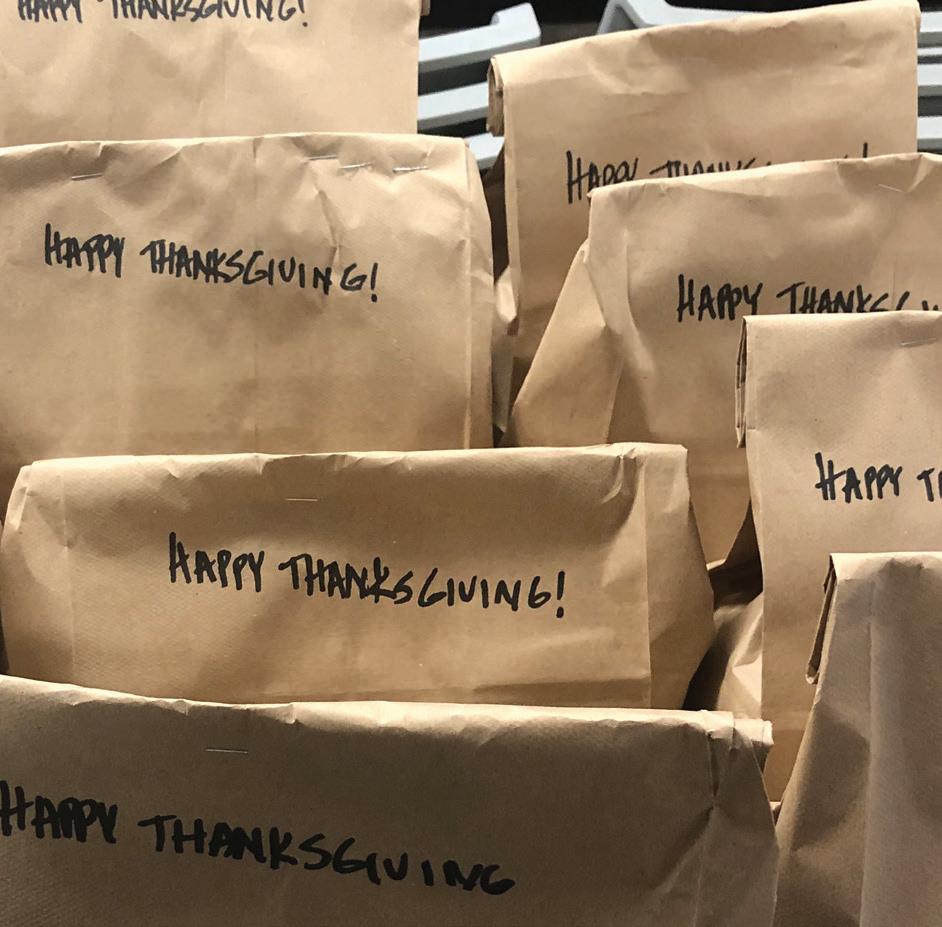
“We have a great sense of pride and are thankful to provide healthy and nutritious meals for the men and women who have served our country,” said Michael Rouff, Director of Dining Services.
In partnership with CulinArt, the school hosts events that provide relief to veterans in need, like providing bottled beverages, packaged snacks, and apples. Chefs also teach cooking classes at the VA and teams prepare care packages for veteran families. On holidays, they provide warm dinners for the local Meals on Wheels .
In 1997, Thompson Hospitality and Compass Group USA formed a strategic partnership, making history as the first deal between a major food service company and a minority firm. Steeped in tradition while constantly adapting to a changing environment, this family-run company is a place where exceptional people can excel. Today, together with Compass, they serve more than 30 of the Fortune 100 companies, large colleges and universities, urban school districts, and major hospital centers.
Warren Thompson is the President and Chairman of Thompson Hospitality (TH). His sister, Benita Thompson-Byas, joined the company a month after its inception. Amy Keister, Global Director of Sustainability for Compass Group, sat down for an interview with Benita, the unassuming powerhouse within this barrier-breaking organization.

Q: “It isn’t simply what you do in your life that matters, it’s who you are.” This was the creed of the patriarch and teacher, your father, Fred Thompson Sr. and how his three children have chosen to lead the company since its founding in 1992. How has this philosophy influenced your leadership style and, ultimately, the success of Thompson Hospitality?
A: What our father meant by this creed is that it’s not your accomplishments that matter so much as your character. Warren started Thompson Hospitality with 3 goals in mind:
1. Take care of our parents
2. Make it a family business
3. Give back to the community
Q: A big part of what Thompson Hospitality does is connect Compass clients with diverse suppliers. This is a win for everyone. It produces significant value within client communities, expands their diversity, equity & inclusion journey in a way they could not do on their own, and grows minority-owned businesses. Tell us how this works.
A: Because of Thompson Hospitality’s size and scope, we are well known in the Minority Business and Supplier Diversity community. We are a member of the National Minority Supplier Development Council’s Corporate Plus® program for NMSDC-certified minority businesses of the highest caliber, who have demonstrated their capacity to execute national contracts for major corporations. This gives us even greater access to certified minority-owned businesses and a heightened understanding of their capabilities. Because of that, we introduce them as Tier 2 suppliers in our Compass-TH partnership accounts, as well as in our Historically Black College or University (HBCU) contract operations.
Q: Can you share a company you helped grow and its impact on the community?
A: Ms. Jana’s Candy is a great example. Jana Farmer had a personal friendship with one of my VPs, Olivia Dorsey. She asked Olivia how to go about moving her hobby of making candy to a business. Olivia helped her create a corporate entity and achieve certification as both a minority and woman-owned business. She introduced Jana to some Compass Group chefs who evaluated her product and provided suggestions on packaging, marketing and distribution of her marvelous candies. Today, Ms. Jana’s Candy is part of the Foodworks Apron Exchange program and has expanded her business substantially to her own brick-and-mortar location in Aurora, Illinois.
Q: Giving back is a core value at Thompson Hospitality, like creating accessible career pathways for students. The Navigate program partners with Thompson Hospitality and Compass Group to teach underserved, high-potential high schoolers, giving them the tools to change the trajectory of their lives. Would you talk to us about the program and its impact on young adults?
A: Navigate is one of the programs of which I am proudest. We started with 17 kids in our Coca-Cola account with FLIK Hospitality. All 17 of those young people, after they completed their training, were offered and accepted jobs in various Compass accounts. That was back in 2018. Today, Navigate has changed the lives of nearly 150 young people and counting!
Q: On Thompson Hospitality's 30th anniversary, you remarked that it's all about legacy and being a role model for the future of hospitality. What is the legacy you want to leave?
A: We found by developing meaningful relationships with communities, we help unlock opportunity. Transformation begins with job creation, access to education and economic empowerment. Whether we are helping young people embark on a career path through the Navigate program or creating business growth for diverse suppliers, we are providing avenues for community transformation.
Our father taught us to believe that we could achieve anything we want through hard work. At Thompson Hospitality, we live our values. Every community we touch must be better because of our presence.
CulinArt partnered with client T. Rowe Price (TRP) to celebrate Juneteenth by inviting neighbors in the restaurant community onto campus to share their delicious food and inspiring stories, raising awareness of local Black-owned restaurant operators while supporting their businesses.

Juneteenth , also known as Freedom Day, is in equal measure a remembrance of both the long, hard night of slavery and subjugation, as well as a celebration of the promise of a brighter morning to come.
Local restaurant owners served samples of their specialties to TRP customers in cafes, while CulinArt staff extended the celebration all week by hosting Chef’s Tables inspired by those tastings.
Hue Café & Apothecary is just 5 minutes away from the TRP campus in Owings Mills, MD. Founders Ejami ‘Mama Hue’ McNeill and husband Aaron ‘Chef A’ McNeill run the plant-based scratch kitchen and tea bar, plus a catering business. Their journey to a plant-based diet started after Ejami lost her mother to congestive heart failure and COPD. The duo provided a vegan tasting menu of tempeh “shrimp” & grits, collard greens and their signature drink, Lady Hibiscus Tea . At two Maryland campuses, nearly 2,000 guests enjoyed the tasting and purchased more than 100 meals.
Luchals in Colorado Springs is also run by a husband-and-wife team who wanted to create a menu that would be sustainable, gluten-free, and ignite a feeling of excitement and happiness through Cajun American Seafood that touches the soul. Military veterans, TJ and Chantal Lucas served upscale hors d'oeuvres from their catering menu of shrimp and grits and catfish nuggets.
“T. Rowe Price welcomed our associates with open arms,” said Chantal, in describing how the partnership benefitted her business. “This event definitely helped with awareness and we hope to be part of future events.”
Three hundred associates enjoyed the tasting and supporting the local catering business, which gained new customers following the event.
Since its opening, the James Beard Award-nominated Sweet Home Café has become a food celebration destination during February in honor of Black History Month. The edible exhibit is housed inside the Smithsonian’s National Museum of African American History and Culture in Washington, DC.
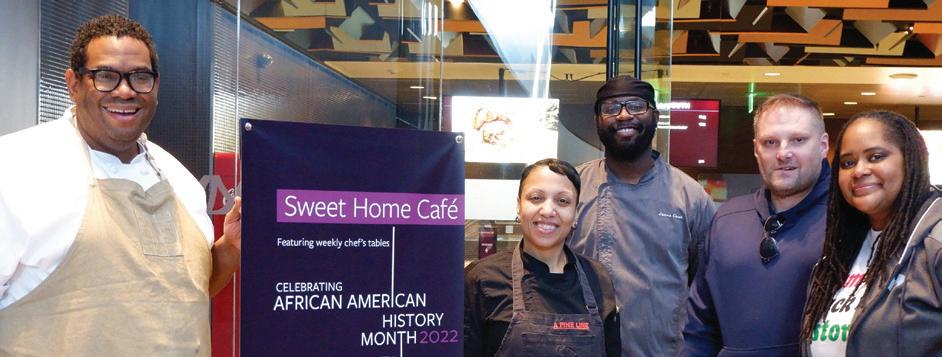
Managed as a joint venture by Thompson Hospitality and Restaurant Associates (R/A), Sweet Home Café showcases the rich culture and history of the African American people with traditional, authentic offerings as well as present-day food traditions. With live cooking demonstrations, Sweet Home Café brings families and friends together to celebrate Black history around the globe through hospitality, from-scratch cooking, a rich blend of flavors and traditions. Every Friday, and extending into the weekends, Black chefs from R/A and the surrounding community share stories from their heritage through exquisite menus curated in the kitchen.
“At Sweet Home Café , our mission is to promote the rich significance of cultural diversity, to help drive innovation and inclusion on many different levels while respecting cultural sensitivity,” said General Manager Denise Jones. “Our goal is to empower our Black employees and help them develop their talent and reach their potential.”
The dining experience at Sweet Home Café is led by Executive Chef Ramin Coles. Born and raised in the DC-metro area, Chef Coles kicked off the celebrations with his delicious braised short ribs and fish imperial dishes, bringing warm feelings and good memories to guests that tie them to their families.
Culinary entrepreneur and owner of Island
Bwoy Cuisine Mark Henry featured his local Jamaican-inspired sausages, sauces and sensational seasonings, like the jerk chicken sausage gumbo, and braised Jamaican oxtail.
Portia Brown, Executive Chef at Restaurant Associates at the World Bank in Washington D.C., served up excellence with a southerninspired menu: cornmeal-fried catfish, periperi pomegranate molasses BBQ ribs, blackeyed pea succotash and coconut cashew creamed spinach. Guests raved about Portia’s banana pudding dessert, a staple at the end of every family gathering.
R/A chefs Alexandra Strong and Jaycee Couch closed out the celebrations with their Afro-Caribbean menu featuring Couch’s jerk chicken with piri-piri sauce originating from West Africa. She used scotch bonnet peppers and different herbs to make a blend that allowed her cultures to come together. Chef Strong created a bread pudding inspired by yuca cassava with a guava glaze to honor her Puerto Rican heritage since guavas “go with everything.”
Gardening can offer a way to connect with yourself, the earth, and your cultural heritage. That’s why Black Voices Employee Empowerment Group , part of Restaurant Associates’ DIAC, organized a Juneteenth roundtable discussion called Planting for the Mind, Body & Soul to teach the African origins of many fruits and vegetables, along with the basics of gardening.
“I came up with gardening because it brought calmness and peacefulness into my life during the pandemic, and knew it could do the same on Juneteenth,” said R/A manager Saige BrogdonCruz. “Growing and caring for plants brings this extra sense of accomplishment and pride. And it teaches patience.”

The roundtable included special guest Gardner Kofi Thomas from The Good Life Garden in Brooklyn, NY, who turned an abandoned garbage-filled lot into a beautiful public space, creating a sense of community that spans generations. A variety of fruits, vegetables, flowers and herbs grow in the 13,000 sq-ft plot, plus there is a separate gardening area for seniors in the neighborhood.
Roundtable takeaways:
• Getting your hands into dirt releases serotonin, the ‘happy’ chemical
• The smell of lavender is calming
• Beginning gardeners should research plants before growing and be patient
• When slaves were freed, they traveled with seeds from fruit and vegetables to be selfsufficient and grow their own food
After the roundtable, those who attended took a garden tour and were given tips, including soil recommendations and how to re-pot a plant. The event was also live-streamed to give everyone in the company a chance to glean information.

Source: Food and Agriculture Organization of the United Nations
We have committed to reaching Net Zero greenhouse gas emissions across our global operations and value chain by 2050 and carbon neutral on Scope 1 & 2 emissions by 2030.
Our ambitious reduction targets have been validated by the Science Based Targets Initiative (SBTi).

The food system is responsible for one-third of global greenhouse gas emissions.
Bon Appétit Management Company launched the second generation of its proprietary Food Standards Dashboard in early 2022, expanding the capabilities of the industry’s most sophisticated sustainability and wellness reporting tool. It incorporates more than a dozen new indicators and increases data capture capability in a highly visual, easy-to-navigate format.
“Environmental and social responsibility commitments are meaningless without data showing evidence of action,” said Chief Strategy and Brand Officer Maisie Ganzler, who oversees the team that developed the Dashboard. “When we developed the first version in 2015, we wanted to make data from many sources accessible and transparent at a glance to our chefs and managers so they could see how they measured up to our company-wide commitments.”
Now, the newest version extends that capability to offer teams a comprehensive view of their café — from greenhouse gas emissions related to purchases to the breakdown of animal versus plant protein — clearly illuminating actions they can take to make their operations and menus more sustainable and healthier for guests.
To offer a snapshot of a café’s performance, the Dashboard has dedicated tabs for purchasing, climate change, plant-forward menuing, and wellness that pull information from purchasing, finance and menu-management systems to compare a complex set of data against a long list of business rules.

Gives chefs an at-a-glance view of compliance with a variety of sustainability criteria at the product level, with pop-outs on noncompliant purchases to influence future purchasing behavior. Metrics include the percentage of spend that meets Bon Appétit’s Circle of Responsibility (COR) sustainability standards, Farm to Fork (local purchasing) as a percentage of total food spend, and by product category such as meat, produce, and dairy.
Displays the focus areas of Bon Appetit’s Low Carbon Lifestyle, tracks waste-related programs, and provides a snapshot of where greenhouse gas emissions are most impactful in each operation. In addition, robust World Resources Institute -driven data tracking shows chefs the carbon impact of their recipes. It simplifies reporting for clients who want to commit to the Cool Food Pledge, a growing movement to put sustainability on the menu.
Encourages chefs to shift menus toward plants and away from animal products by offering a variety of visualizations, including:
• a pie graph overview of animal and plant product purchases in both dollars and weight
• a snapshot of vegetarian and vegan offerings per meal period
• a bar graph comparing animal and plant protein purchases by weight and overall animal protein served per guest per meal
Includes a first-of-its-kind graphic representation of a “Wellness Plate” using purchasing and menu data to show an operation’s alignment with EAT-Lancet Commission’s guidelines for a healthy and sustainable diet.
“The new Dashboard is designed to measure the sustained culture shift we’ve made as a company,” said Ganzler. “Instead of tying chefs to computers, we worked to give them indicators that allow them to immediately see the impacts of their menu choices and give them simple, straightforward actions that will have positive long-term impact on their guests and the environment.”

World-class retail experiences require a complex infrastructure of warehouses, trucks, vans and people to deliver products to customers. For retailers looking to reduce their carbon footprint that means every business process must be reviewed and potentially modified to ensure the lowest impact on the planet. What may sound like an overwhelming process to some is an exciting opportunity for the Canteen team dedicated to developing next-generation, net-neutral retail infrastructure across all touchpoints of business.
100% of Canteen warehouses across the country are getting a makeover. An assessment of each location focuses on areas to reduce or eliminate emissions including refrigerants, energy sourcing and efficiency, and waste management practices. This comprehensive evaluation helps prioritize the largest sources of greenhouse gas (GHG) emissions and how best to mitigate them.
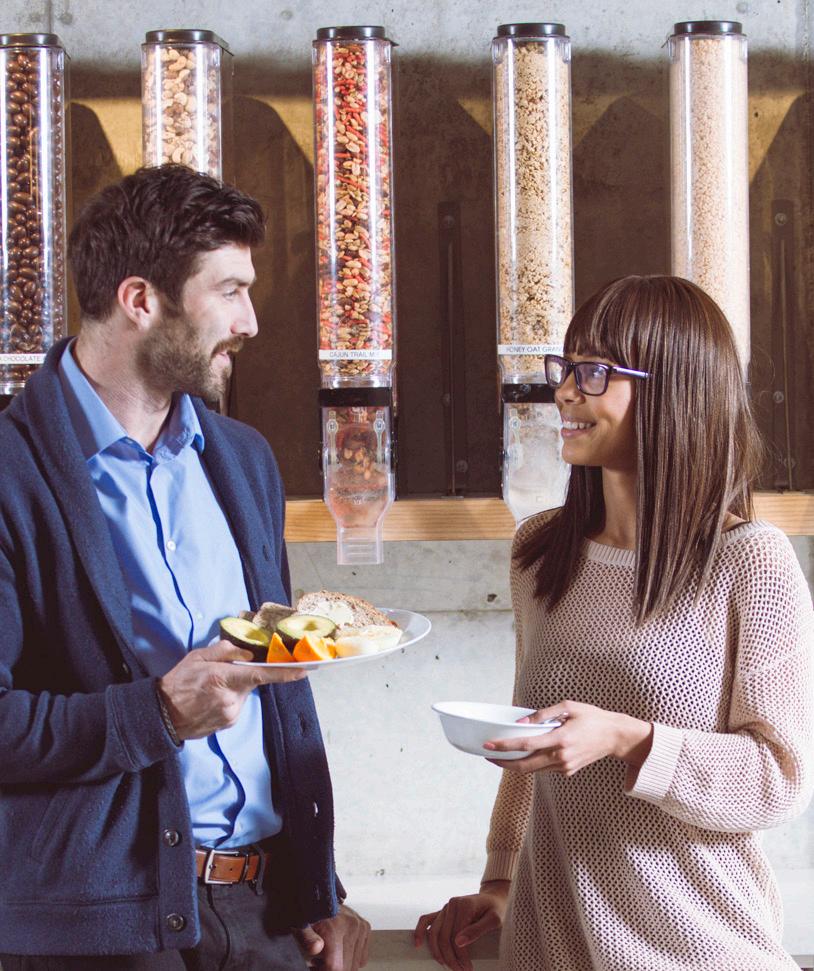
Minimizing supply chain waste is a big part of reducing Canteen’s GHG footprint as more than half of its carbon emissions come from supply chain partnerships. Best practices will be implemented in branches to help associates improve recycling rates and food-waste diversion. Through employee education, engagement and improved infrastructure in Canteen facilities, the goal is to reduce the overall volume of waste going to landfills.
Additionally, Canteen is rethinking procurement and how products get delivered to their branches with a commitment to be an innovative partner in the Consumer Packaged Goods (CPG) space. The team is actively exploring how supplier partners can reduce or eliminate waste upstream in the supply chain.
By the end of 2022, alternative fueled vehicles will start to replace the fleet of traditional trucks and vans in the Bay Area that deliver products to Canteen customers. This is thanks to a partnership with Motiv, a company that specializes in commercial all-electric trucks and buses.

The infrastructure that makes up markets, pantries, and even vending is under evaluation. “Our vision of the Net-Zero breakroom is a space where innovation reduces environmental impact and maximizes the breakroom experience. It embodies how Canteen does business in "this age of climate change,” said Heather Putnam, Director of Sustainability.
Canteen will continue to deliver unforgettable retail experiences that are good for the customer and even better for our planet as part of its commitment to sustainable business development, a commitment that is changing the retail space within Compass Group.

With climate labeling in effect, millions of college students across the country understand the environmental and social impact of what they eat at dining halls, thanks to an exclusive partnership between Chartwells Higher Education and HowGood.
HowGood is an independent research company with the world’s largest ingredient and product sustainability database. This partnership empowers guests to make more informed dining decisions that better support the planet. Chartwells is helping its partner campuses achieve their net-zero goals by integrating HowGood ’s industry-leading impact data into its dining menus nationwide.
HowGood has worked with major food brands like Chipotle to evaluate every recipe across eight key impact metrics, all of which are built scientifically from over 550 data sources and certifications.
Chartwells recipes will be rated based on the impact metrics chosen. Labels are prominently displayed on dining hall menus and digital signage at partner campuses nationwide.
With a commitment to improving the health of its employees and the planet, the World Bank Group Headquarters (WBG) in Washington, D.C. developed its own wellness brand. Well World , designed by both Restaurant Associates (R/A) and WBG, encourages conversations around sustainability and plant-based eating with a well-recognized logo that allows guests to quickly identify menu items made without red meat.
Taking their sustainable menus further, the R/A team at WBG committed to the Cool Food Pledge to reduce greenhouse gas emissions through food by 25% by 2030. WBG’s progress is already ahead of schedule with 70% of menus featuring plant-forward recipes across campus, including catering.

“The World Bank Group takes pride in its culturally diverse community and that is reflected in our menu offerings. R/A has done a great job highlighting international cuisines while presenting various plantforward dishes to showcase how sustainable efforts translate globally,” said Allison Berg, World Bank Group, Global Corporate Solutions.
To further increase awareness around sustainability and nourishment, various wellness events and promotions are also held under the Well World brand.
Beyond the plate, WBG has worked closely with R/A to completely eliminate plastic beverage bottles and successfully transition to 100% compostable to-go containers, utensils, napkins, cups, and even sushi containers.

Compass Group announced an ambitious first-of-its-kind climate goal: reach net-zero greenhouse gas emissions (GHG) across our global operations and value chain by 2050, and be carbon neutral on Scope 1 and 2 GHG emissions by 2030.
To meet this goal and support similar client climate goals, Compass Group associates are looking for easy ways to track greenhouse gas emissions and reduce the cafe's footprint. The Carbon Foodprint software does exactly that.

Our award-winning tool is designed to measure the carbon, water and waste of café operations at the unit level. Multiple dashboards allow users to see the location’s baseline and then create an action plan to reduce its footprint, tracking progress over time.
In 2022, the dynamic system got even better. Data from Waste Not 2.0 , Compass Group’s proprietary waste-tracking tool, now feeds into the database. Emissions factors were also updated to ensure we have the most recent data available.
The Restaurant Associates team at JP Morgan Chase decreased its carbon footprint emissions 33% per guest, from 14.5 lbs CO2e per guest in March 2022 to 9.6 lbs CO2e per guest in July 2022. Much of this progress is from a 54% decrease in beef emissions as the team focused on promoting plant-forward menu options throughout the portfolio and matching the weekly animal protein special with a vegetarian option. Because lowering carbon is a priority for Restaurant Associates and their client, they share best practices on weekly chef calls.
“The team at JP Morgan Chase enjoys the challenge of lowering the carbon footprint. Some months we will run contests to see which unit has the best numbers! This platform allows us to really measure how we are doing.” - Chef
Kyle DaileyChef Phillip Wagner and the Eurest team at a large financial company focus on flavor first by creating vegetable dishes that are as tasty and satiating as meat. They encourage guests to move outside their comfort zone and try new plant-forward menu items. In October 2021, beef made up nearly 50% of the emissions from the menu, down to 28% ten months later by:
• Reducing portion sizes of red meat
• Increasing and promoting plant-based menu options
• Incorporating well-liked plant-based proteins, like vegan chorizo
• Better understanding which menu items guests enjoy
• Focusing on creating delicious, low-carbon dishes
The FLIK team at a multinational food company participate in the Cool Food Pledge and use Carbon Foodprint to lower their carbon emissions. In just seven months, Chef Chad Wilkoff reduced emissions from beef 47% per guest and reduced the cafe's carbon footprint per guest from 12.51 lbs CO2e to 10.46 lbs CO2e. The company is committed to reducing greenhouse gas emissions from food 25% by 2030, and the dining team is helping them reach this goal with plant-forward thinking:
• Incorporating plant-based protein products into menus
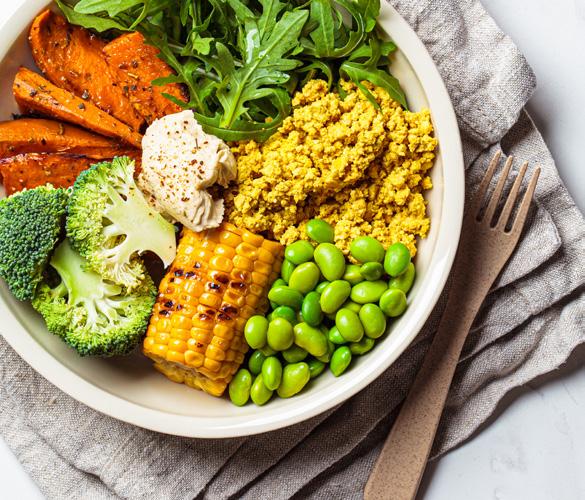
• Being intentional about red meat use
• Using promotions to encourage guests to try plant-based options
• Adding a plant-based chicken option to the salad bar menu
• Planning a month of menus at a time
Chef Chad has become passionate about incorporating more plants into his menus. He fell in love with what the plant-forward diet did for his own health and energy levels after learning about the benefits of plants through the Cool Food Pledge course.
Using insights from Carbon Foodprint , Restaurant Associates Wellness Manager Hannah Kutzin keeps carbon emissions low for a large client in New York City. From October 2021 to June 2022, beef made up less than 3% of all emissions from the menu. The café has a dedicated station that focuses on plant-forward dishes, promotes ‘Meatless Monday’ and offers samples so guests can try plant-based menu items before they buy.
"Our team is excited about the progress we’ve made so far in reducing our carbon footprint. We are looking forward to continuing to contribute toward Compass Group’s sustainability goals."
- Hannah Kutzin
For one of the largest financial centers in NYC, return-to-office was the perfect opportunity for Restaurant Associates to create an outstanding guest experience in the café, an experience where customers can collectively make a difference and drive change. Since reducing food waste and their carbon footprint has always been a priority, #NoBeefWeek presented an impactful approach.

#NoBeefWeek is an initiative that encourages chefs and operators to eliminate beef from their menus for one week to reduce greenhouse gas emissions. Regional Executive Chef Michael Fraino first heard of this concept at the 2022 Menus of Change conference where Dr. David Katz of True Health Initiative and Yale’s Prevention Research Center spoke about the potential impact. Knowing the difference a week could make, Chef Fraino wanted to take it even further.
Since June 2022, Chef Fraino and his team have reduced purchasing of red meat by 95% without a single complaint from guests. The only beef left on the menu is the sustainably raised Pat LaFrieda burger, a nod to the local partnership between LaFrieda Meat Purveyors and Creekstone Farms. As the client’s returnto-office rollout continued, café transactions increased to nearly 35,000 per month. Chef Fraino educated colleagues on alternative animal and plant proteins, letting flavors shine and further proving the success of a reducedbeef menu.
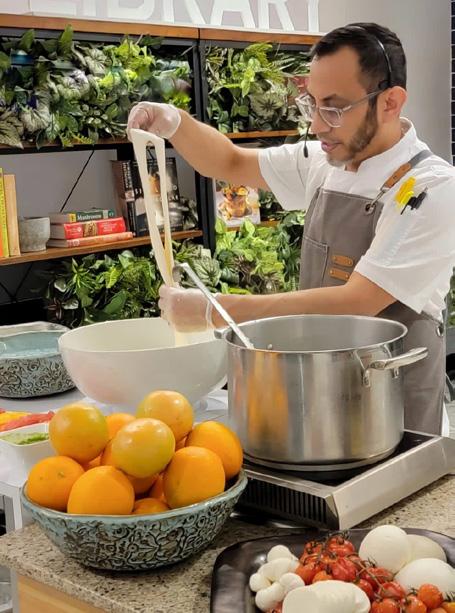

With more than 500 covers per day, the Global hot bar has made a huge difference. Where guests used to enjoy roast beef or flank steak as their main source of protein, the culinary team now features meatloaf with turkey and lentils, Steelhead trout, a variety of beans and legumes, and smoked tofu depending on the regional origin of each dish. In place of beef stews at the self-serve soup station, a new favorite is lentil and vegetable. And instead of upselling short rib tacos at the weekly Chef’s Table, the team elevated the experience by highlighting responsibly and sustainably sourced Icelandic cod with a citrusy salsa featuring local cranberries.
Engagement is at an all-time high and the team is proud to be on the right path to reversing habits that damage the future of our climate. They’re confident the choice to reduce beef will contribute to a positive future for our planet.
Global demand for beef is the leading driver of deforestation in the Amazon.
Making the right decision, the easy decision, is at the heart of Compass Group’s sustainability strategy. The world’s largest food and support services company is now partnering with Do Good Foods™, a company on a mission to combat climate change with the first USDA-verified chicken brand with ‘carbon-reduced’ benefits. Appropriately, it’s named Do Good Chicken™. By adding nutritious surplus food to their chickens’ diets, Do Good Foods also reduces food waste.

The first-of-its-kind partnership with Do Good Foods reinforces Compass Group’s Net Zero commitment and efforts to work with clients and suppliers to halve food waste across the company’s global operations by 2030. As founders of Stop Food Waste Day™ , the annual international day of action aimed at reducing food waste, it further builds on Compass Group’s leadership and sustainability journey that includes cultivating partnerships with purpose, and aligning with the United Nations Sustainability Development Goals.
“The problem of food waste is hard to overstate and I know there are things we can do as a community of chefs to make real change,” said Sam Kass, Chief Strategy Officer of Do Good Foods and former White House Chef & Senior Policy Advisor for Nutrition. “From previous work with Stop Food Waste Day , I know that Compass Group is committed to finding and implementing meaningful solutions. This partnership is another way we can empower chefs to promote a healthier planet through food.”
of all food
35% million pounds of food surplus in the first 6 months of the Do Good Chicken launch were diverted from landfills, preventing an estimated 950 metric tons of greenhouse gasses (CO2e) from entering the atmosphere.

goes unsold or uneaten in the U.S. that’s nearly 90 billion meals every year.
In September 2022, Do Good Chicken began appearing on café menus at Condé Nast and Google, as well as other venues operated by Compass Group. Through the Compass Group partnership, Do Good Chicken was also served at the US Open Tennis Championships.
“We’re thrilled to join forces with Compass Group in the fight against food waste and its effect on climate change. We know it will take all of us working together to make a real impact,” said Justin Kamine, co-CEO and co-Founder of Do Good Foods. “While every small action made by individuals makes a difference, we recognize the reach and scale of like-minded partners like Compass Group is a huge step forward toward a better future.”
Smoothies powered by a nearby creamery, plant-based nacho “cheese,” and local produce are just a few of the reasons happy and healthy has never tasted better for students across Rhode Island. Serving 23 school districts in the state, the Chartwells K12 team is dedicated to giving kids the foods they love while encouraging them to try new and exciting menu options. Behind the scenes is a dedicated group of chefs, cooks and food service workers focused on making the cafeteria the happiest place in school, and more recently, featuring plant-forward dishes made with fresh and local produce.
Through a partnership with the Humane Society, teams participated in a multi-day training and culinary event to develop new plant-forward recipes and provide hands-on training to chefs in every school district.
“These trainings are about healthy food for kids, variety on our menus, the ability to use fresh, local foods and offerings that are better for both the environment and for animals. It’s about expanding our choices,” said Solange Morrissette, Chartwells K12 District Manager.

Plant-forward menu items became regular features that lasted throughout the year, each one introduced with special events and celebrations.
Hosted at a different school each year, Apple Crunch Day is a celebration of Farm to School Month, where all students take a coordinated bite of their apples creating the signature “crunch.” The Lincoln Public Schools team incorporated apples in every cafeteria concept and featured local Steere Farm Orchards and Jaswell Farm.
Every Thursday in January Chartwells K12 served local Rhode Island foods at all 23 districts across the state, including a poutine-style potato bar featuring Ferolblink Farm, a parfait & smoothie bar with yogurt from Narragansett Creamery, and a Philly Cheesesteak rice bowl with plant-based “cheese sauce” made with vegetables from Shartner and Ferolblink Farms.

During National Nutrition Month, Bring on Breakfast celebrates the importance of nutritious school breakfast in fueling students for success. Smithfield Public Schools hosted a Discovery Kitchen event using the district’s smoothie bike where students pedaled the bike to blend their own smoothie and learned about the best items to incorporate into a balanced breakfast.
Throughout summer break, the Rhode Island team continued serving up happy and healthy for the Central Falls School District through their Traveling Chef program that created a destination for kids while school was out. Features included freshly prepared hot lunches, live cooking demonstrations and Discovery Kitchen events with a continued focus on plant-forward and local ingredients.
“This food is colorful, healthy, and tasty. Our teams are excited to be finding new ways to introduce items to kids and incorporate plant-forward options into their menus,” said Marc Roy, Chartwells K12 District Manager.
A significant goal within the Mayo Clinic charter is to promote and encourage a healthy lifestyle by making plant-based options accessible for caregivers and guests. By consistently putting plant-based options front and center, consumer awareness and purchasing behaviors have started to shift.
Morrison Healthcare’s culinary team created a menu that maximizes whole grains and offers more plant-based options while limiting processed foods, added sugars, and ingredients known to cause disease. Garden Made was designed to meet the specific goals of Mayo Clinic’s wellness and sustainability charter.

“To me, the greatest success is having a satisfied guest reach out and ask for a plant-based recipe,” said Joseph Kraft, Morrison Executive Chef at Mayo Clinic. “Not only are we showcasing the power of plant-based at Mayo Clinic, we are now extending this ‘wow’ moment outside of our walls and into the communities we care for.”
Garden Made offers 8 signature items, including a Crispy Baked Buffalo Cauliflower Grain Bowl and the “Not so Taco” Green Grain Bowl. Every item on the menu is low in sodium and sugar, and packed with whole grains.
Leann Bauer, Morrison’s Wellness and Sustainability Director at Mayo Clinic, understands the impact sustainable menus can have on the system’s goal. “We know plant-based foods produce fewer carbon emissions than meals made with animal protein. Garden Made is contributing to a healthier planet and a healthier workforce.”
Increased focus on plant-based options is yet another stride forward under Mayo Clinic’s commitment to environmental stewardship. Since 2020, the healthcare system has reduced its energy consumption by more than 20 percent with a goal of achieving a 30 percent reduction by 2025.
Each semester, the Chartwells Higher Ed culinary team curates a core menu inspired by seasonal and trending ingredients while focusing on Menus of Change principles , specifically increasing more plant-proteins at the center of the plate. With 10% of the Gen Z consumer base completely vegan or vegetarian, plant-forward options are offered at each station along with a dedicated 100% vegan station.
This proactive approach helps reduce certain animal-based proteins that can have a negative impact on the environment while filling a need for students who are craving more plant-based options. Over the last three semesters, vegetarian options increased by more than 20%.
“Our Gen Z student population is more open to exploring vegan and vegetarian options as the focal-point on their plates,” said Joe Labombarda, VP of Culinary at Chartwells Higher Education. “Leading with plants helps us as culinarians be more versatile and creative with our menus.”
The menu system lends itself to creative customizations from on-site teams as well. At the University of Pittsburgh, the team showcased what can be done with vegan alternatives by creating a mouthwatering Vegan Poke Bowl with marinated watermelon as a replacement for ahi tuna. Recently, the dietitian at the University of Maryland, Baltimore County (UMBC) created edible cookie dough by swapping out the dairy and flour for chickpeas, which are also glutenfree and a great source of protein, staying on trend with GenZers.
The education sector hosted the Nation’s Largest Farmers Market Event where more than 300 campuses hosted local vendors and farmers at the Fall Festiful . This series connected students directly to the people responsible for putting food on their plates, giving visibility to thousands of partners.
Chartwells Higher Education remains committed to prioritizing the needs and desires of its student populations, evolving with trends, and continuing to grow together in ways that are beneficial to the planet.
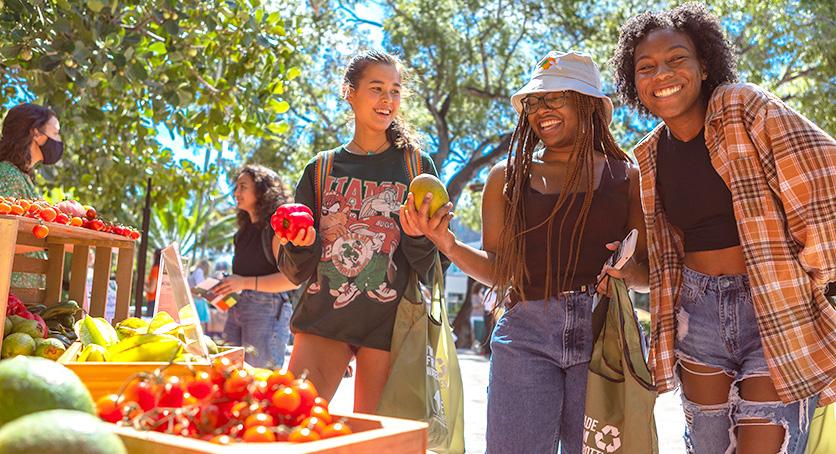
Chefs at Restaurant Associates (R/A) recognize day-to-day choices made in their operations significantly impact the environment. To better measure success and understand opportunities in sustainability, Cafe 802 in Wilmington, DE, partnered with Green Restaurant Association (GRA). With 30 years of experience helping restaurants go green, the international nonprofit organization provides certification and consulting services to shift the industry toward ecological sustainability.
The GRA certification process aims to provide a transparent way to measure environmental accomplishments while offering guidance for increased environmental sustainability. The certification is made up of more than 500 environmental standards. Each standard met earns GreenPoints towards becoming a Certified Green Restaurant. The GRA standards are broken down into 8 categories: energy, water, waste, reusables & disposables, chemicals & pollution, food, building & furnishing, and education & transparency.

The dedicated associates completed GRA education courses and testing to become the first restaurant in the world to have all associates accredited as Green Restaurant Accredited Employees (GRAE).

“We applaud Cafe 802 for becoming the first restaurant in the world with all Green Restaurant Accredited Employees. What an amazing accomplishment and commitment to our environment,” said Michael Oshman, CEO & Founder of the Green Restaurant Association.

After an initial self-assessment to evaluate its current sustainability level within the certification standards, GRA consultants audited the entire facility. The review included kitchen equipment, water fixtures, energy-saving devices, waste collection, food preparation spaces and dining areas. The team submitted supplemental information on menuing, invoicing, recycling haulers, disposables and chemical vendors.
Upon completing the first evaluation, Cafe 802 became a 2-star Certified Green Restaurant. The team worked with consultants to address areas of waste, education and transparency and within a year, became a 3-star certified restaurant.
To reduce waste, the focus started with surplus food donations and composting opportunities. Working with sustainable food waste management company GOODr, the dining team utilized its technology platform to deliver surplus food to local nonprofits. Between January and August, R/A provided 2,700 meals and diverted 3,300 lbs. of food waste from landfills, preventing 1,800 lbs. of carbon dioxide emissions. And in partnership with the facility maintenance team, pre-consumer food waste is now diverted from landfills to feed livestock at local farms.
The journey continues and the process has proven to be rewarding, as the team works to earn GreenPoints that impact the environment with measurable results.


